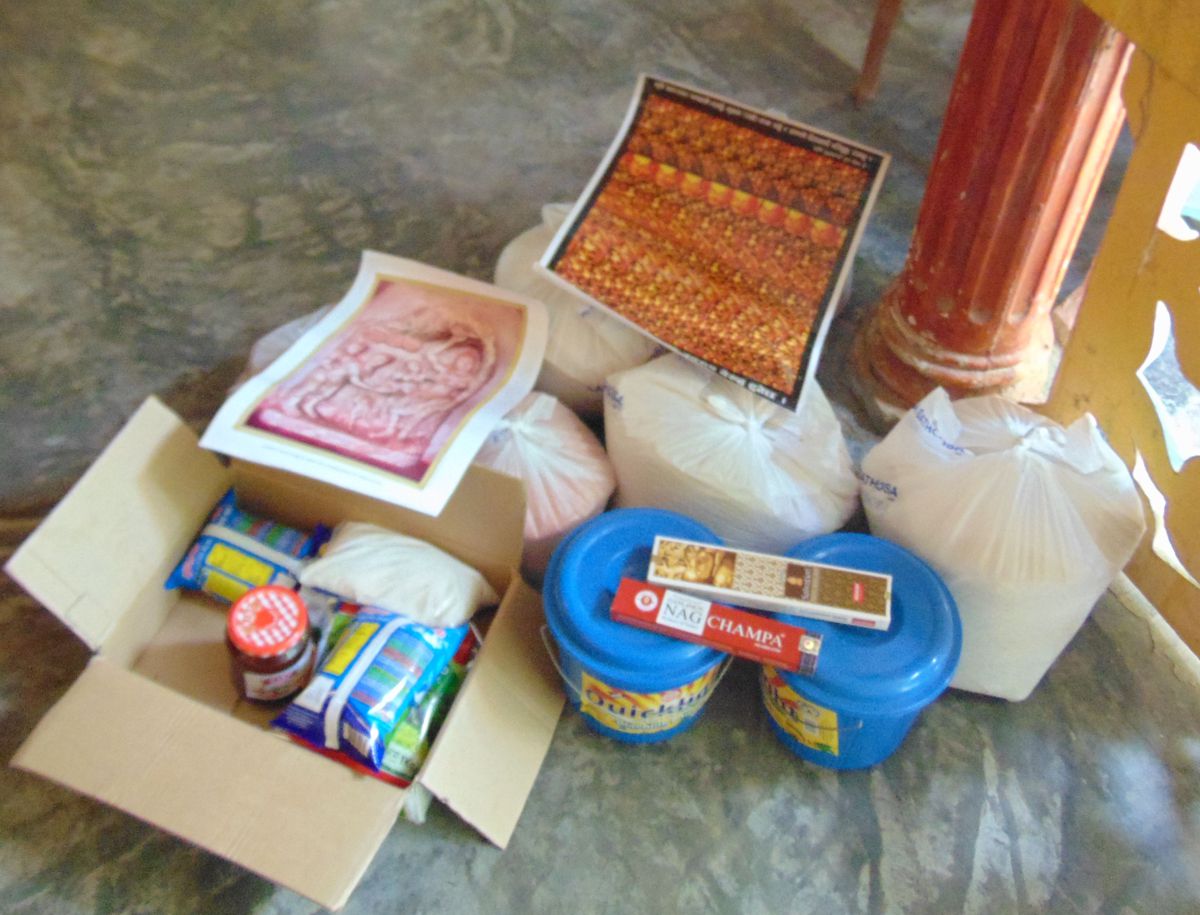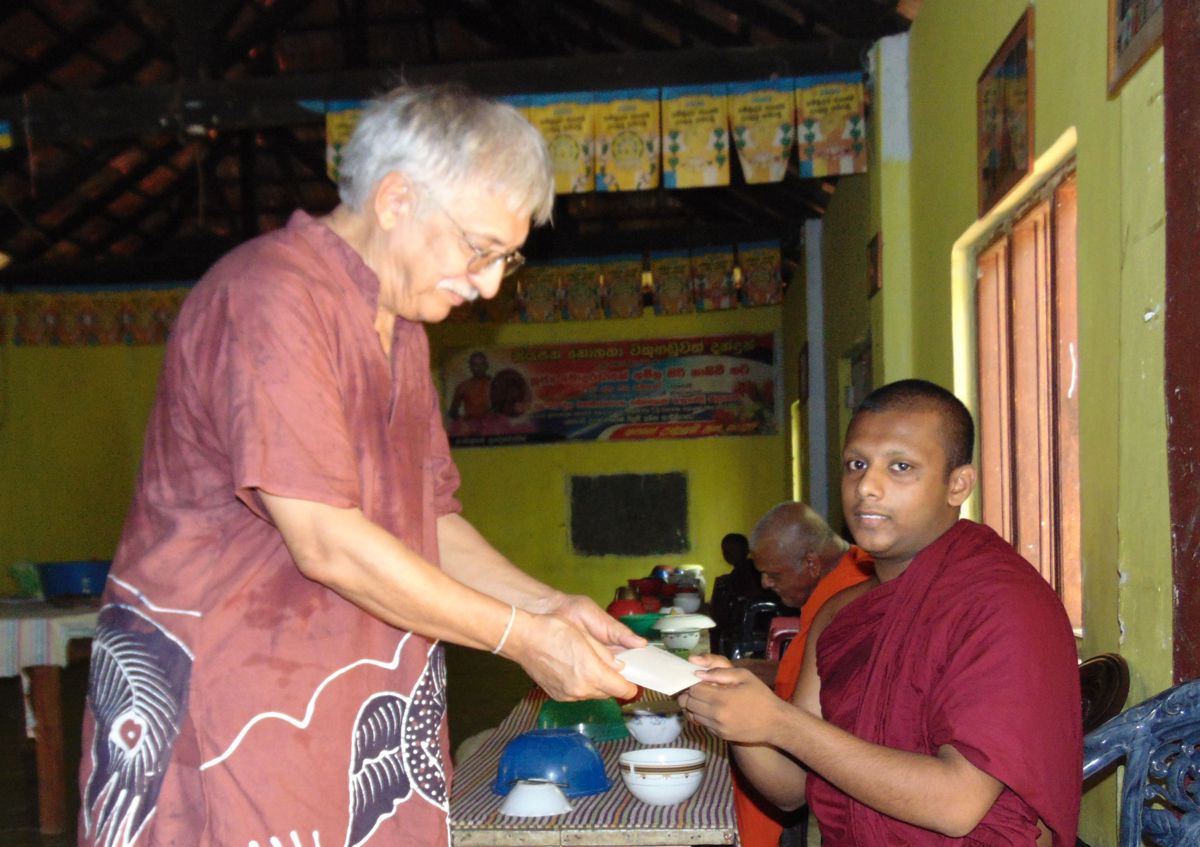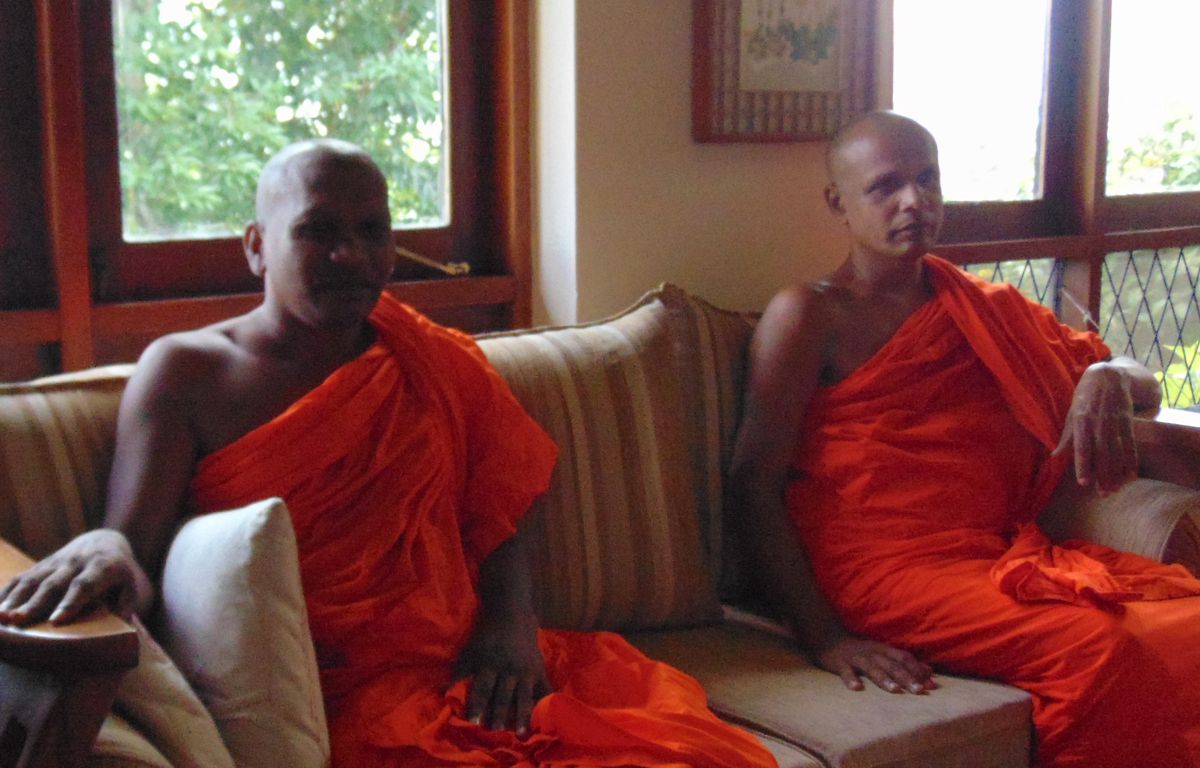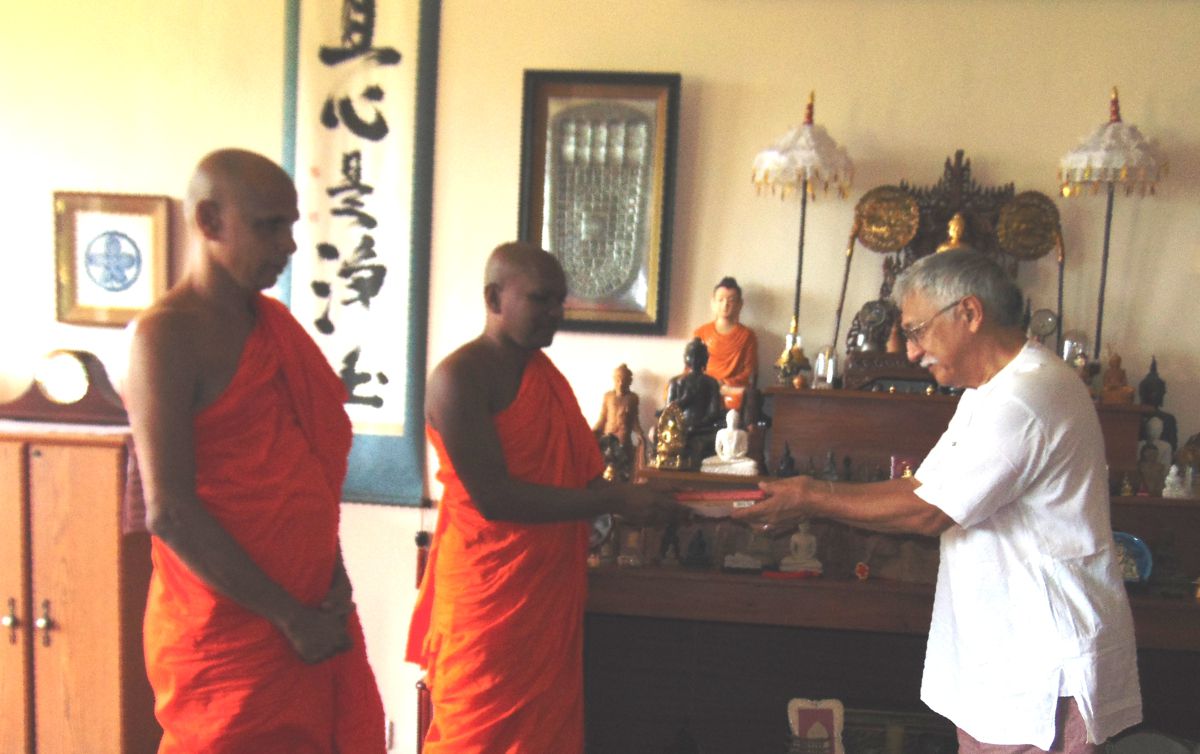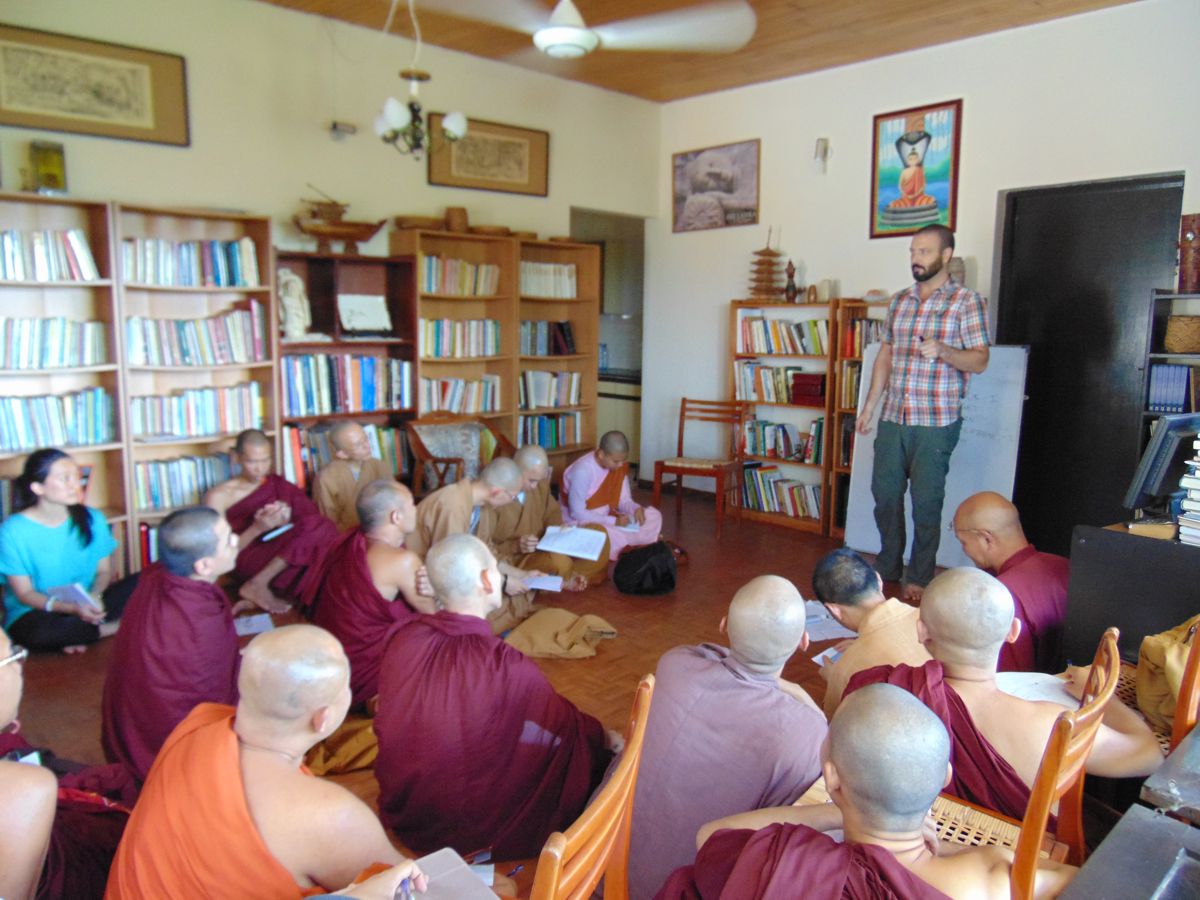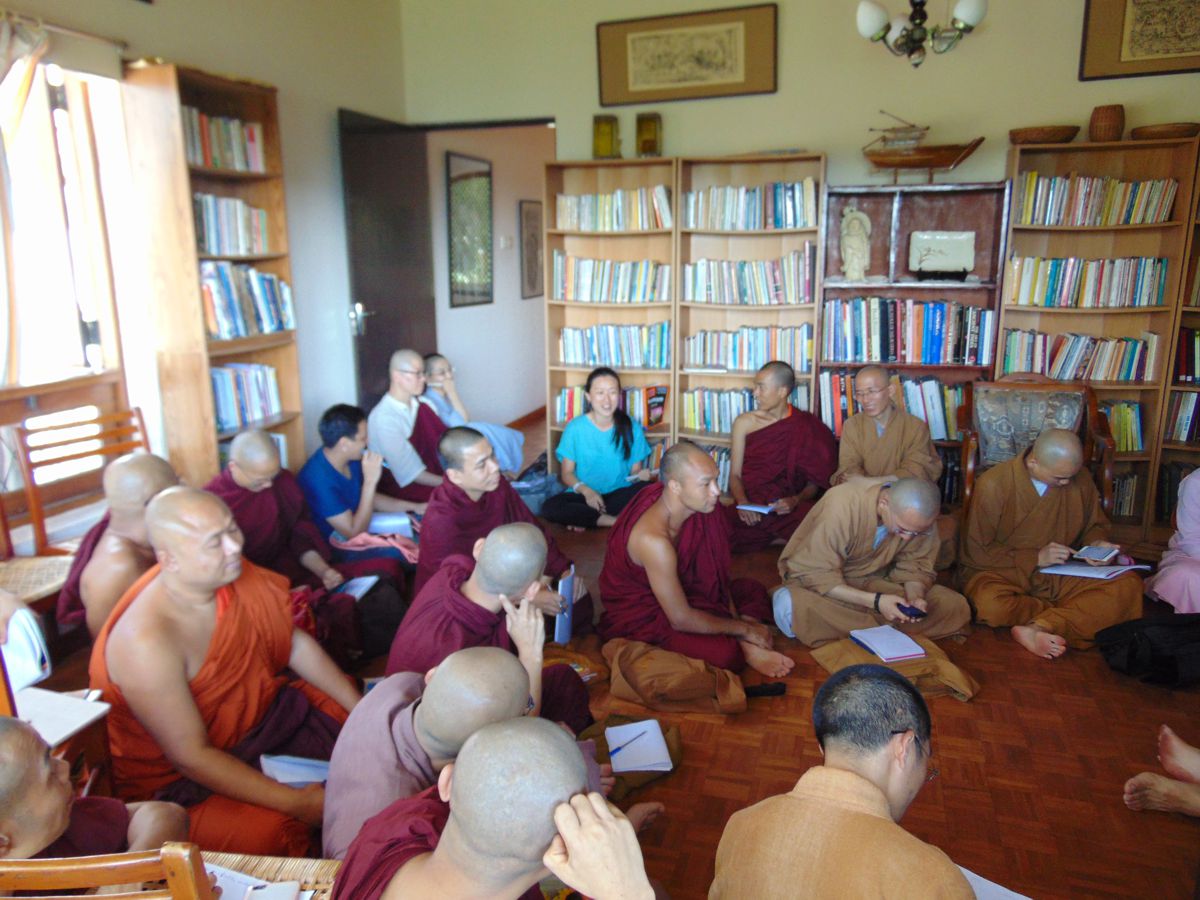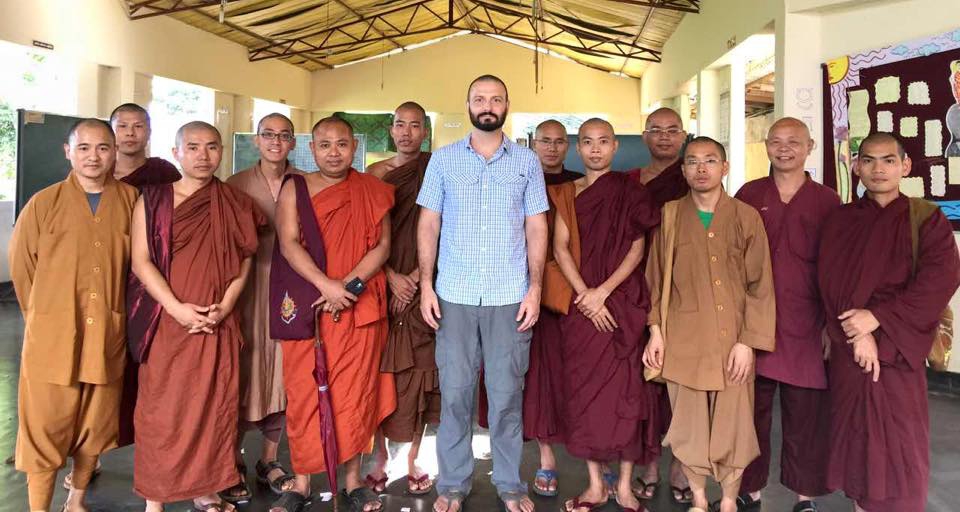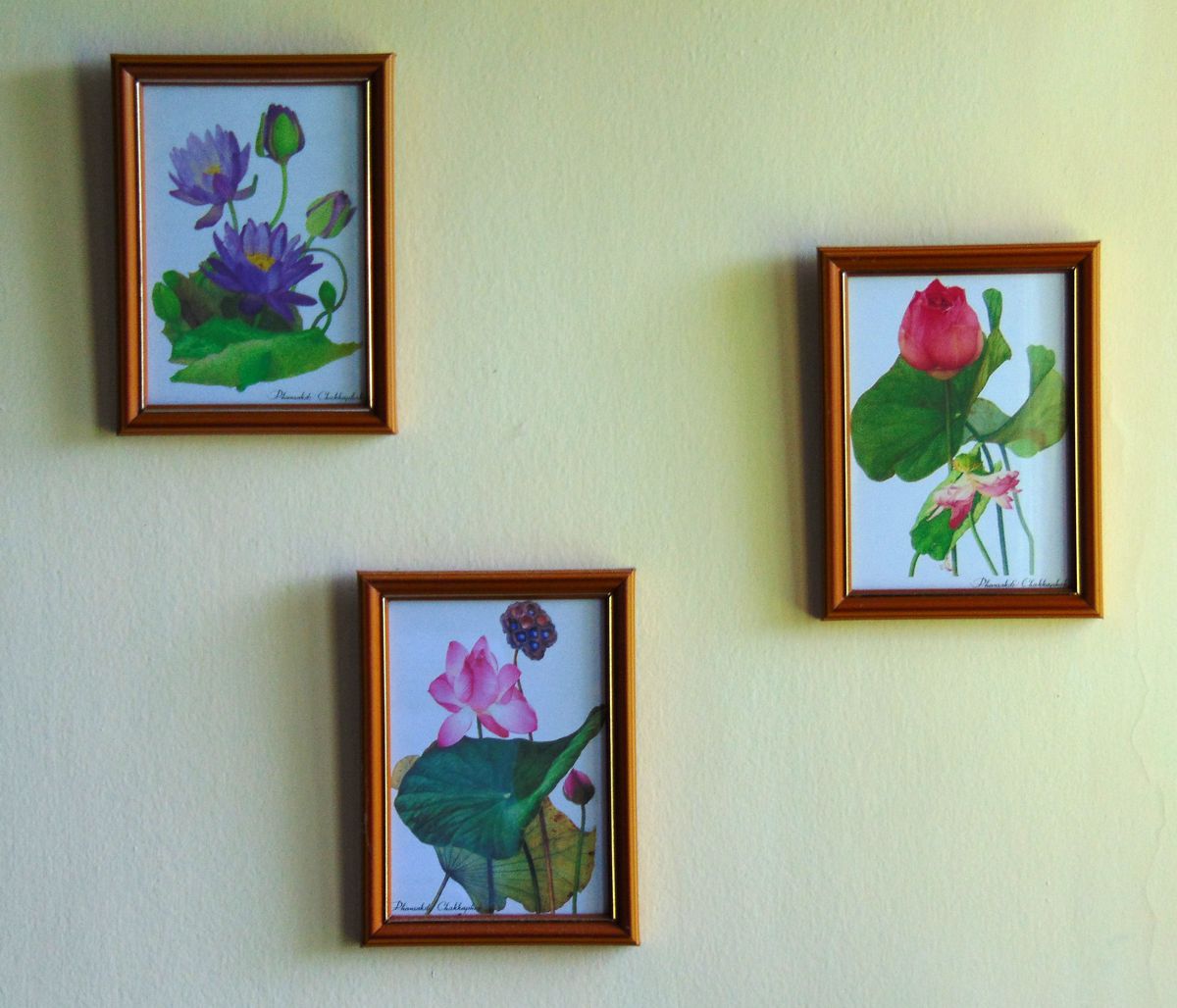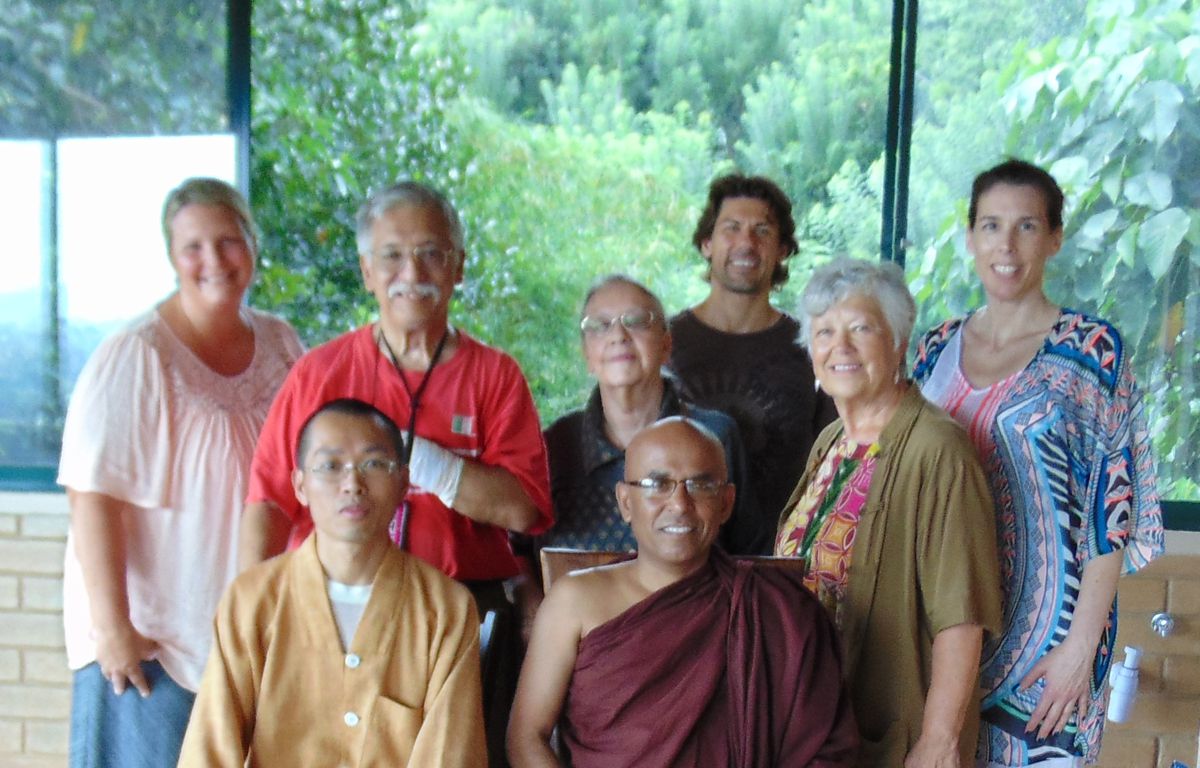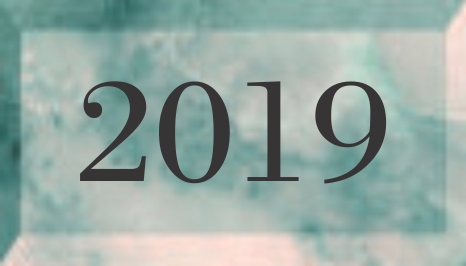|
|
|
|
|
|
First BRM Bangalore Intensive Buddhist English Course
Mahabodhi Society
November 28 - December 23, 2016
|
|
|
Final Call for Teachers!
|
|
|
130 Students:
mostly novices, 12-18 years old |
Level of English:
Beginner -- lower intermediate |
Class periods:
9-11 AM, 2-4 PM |
Evening activity:
Movie, discussion, etc. , 8-9 PM |
Monday-Friday only,
weekends free |
Room in the monastery
and meals provided |
|
Teaching focus: 4 language skills and critical thinking
|
|
|
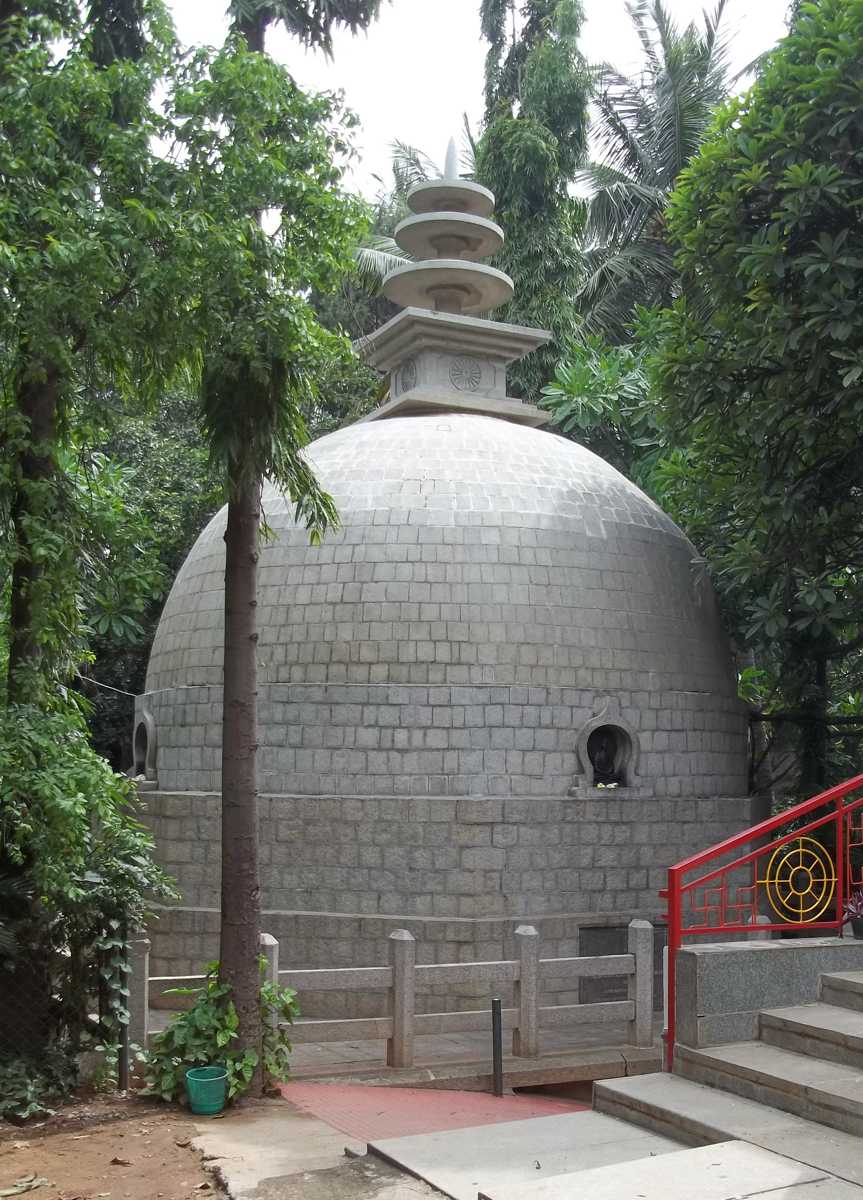 |
Join us for a rewarding
teaching experience!
Eager students!
Exciting classes!
Engaging material!
|
|
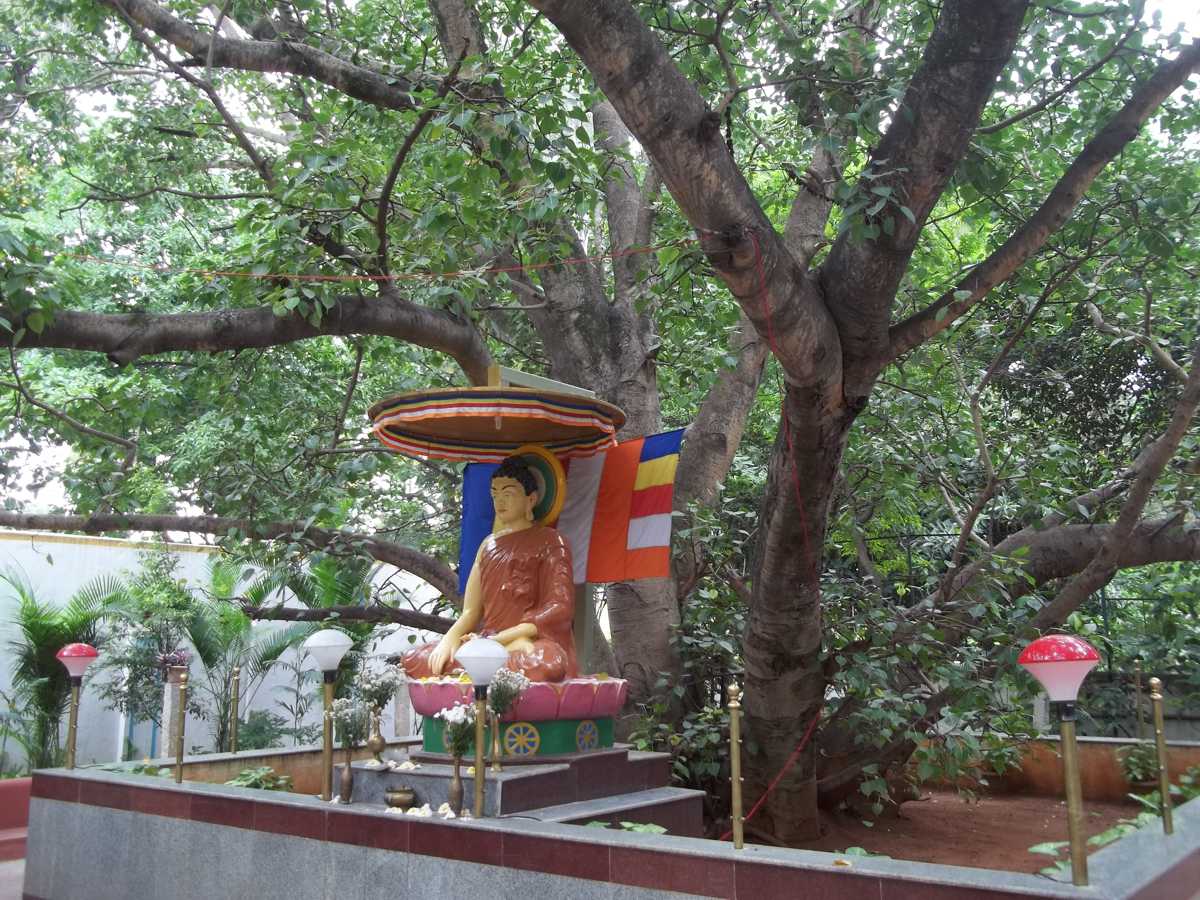 |
|
|
|
|
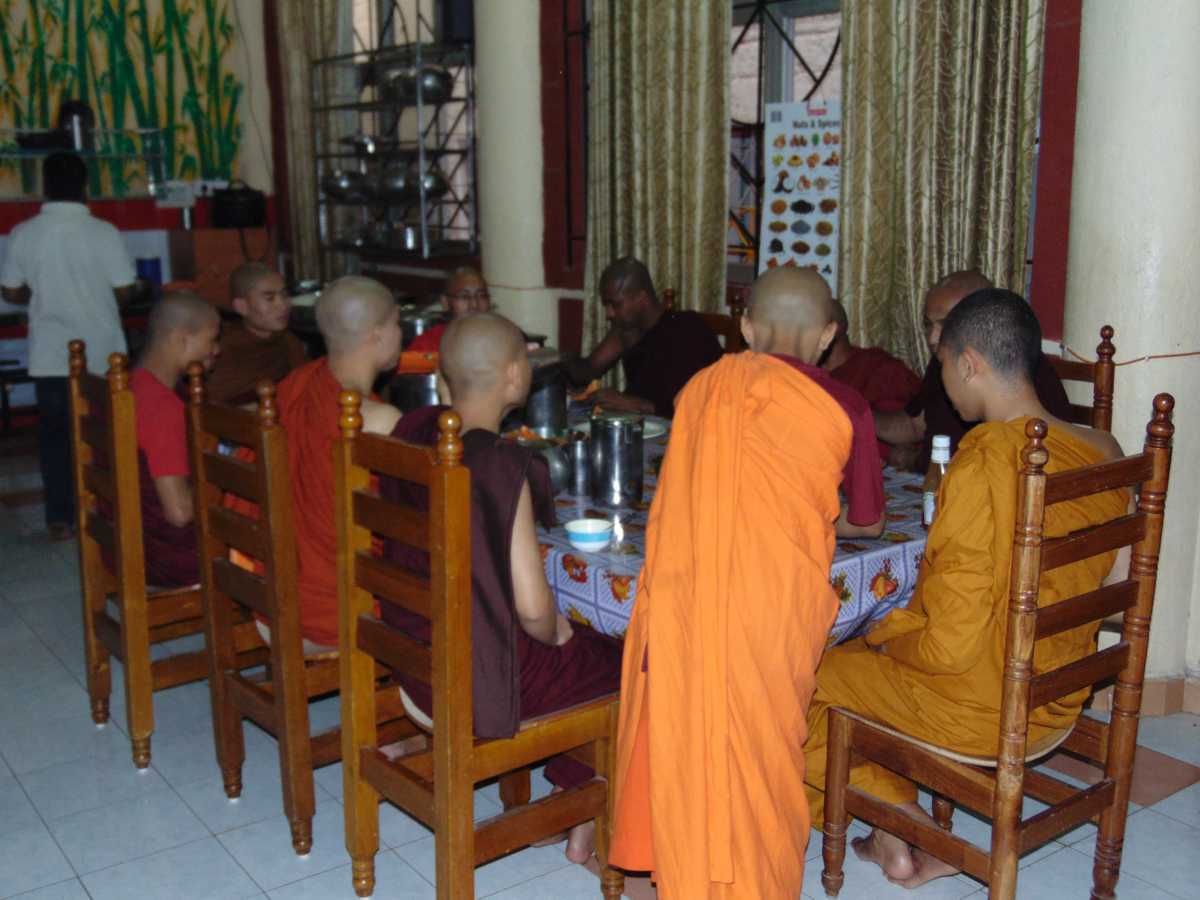 |
|
|
|
 |
|
| Because Buddhist Relief Mission is recognized as an organization with 501(c) 3 status, expenses incurred in volunteering service can be declared as a donation when filing an IRS return. |
|
| Would you like to make a contribution to help cover the cost of meals for the novices and teaching materials?
All donations, big or small, will be appreciated and will be very useful.
|
|
 |
|
|
|
|
|
All donations are IRS tax-emempt and will be duly receipted.
|
|
|
|
Dedication of the Meditation Pagoda
|
|
|
|
|
|
|
|
|
|
|
|
|
|
|
|
|
|
|
|
A Bird in the Head, August 6, 2016
Bad News, Good News
Thirty-five years ago, when we landed in Michigan after our world tour, with Visakha's mother's help, we opened an account with the same investment firm which she used. We stayed in Michigan for only six months, but we maintained a residence in her house for voting and for that account. Knowing that we would have small, if any, Social Security benefits, we regularly deposited savings into that same account, and it grew. When we left Michigan in 2005, a friend agreed to let us use her address as our US residence. As international donations began coming in to Buddhist Relief Mission, it was very convenient to transfer funds from there to Sri Lanka. For ten years, everything was handled by free SKYPE calls, and there was no problem.
One night, on the phone, Ken asked some thoughtless questions, and the agent immediately reacted. "If you are not physically in the US and do not plan to come back, we cannot maintain this account." We were, to put it mildly, shocked. The final outcome was that the account could remain open, but was semi-frozen, with no further deposits possible, although payments out could still be made.
Suddenly we were without a bank! Our social security and royalty payments had nowhere to go. We assumed this was due to regulations regarding money laundering. Please appreciate the irony that this transpired at exactly the same time that the "Panama Papers" were the biggest international news.
Say what you will, we're honest as the day is long, and our finances are on such a small scale as to be laughable. Still, there we were, stuck with no way to deposit our pittances. We also figured that our "financial advisors" or "wealth managers," as they are sometimes called, had to be glad to be rid of us since they didn't make much profit from our little transactions. In case you haven't noticed, banks are heaping fees upon fees--whatever the traffic will allow!
We inquired about the possibility of opening an account with a bank with offices in both Sri Lanka and the US, but nothing was possible. The only bank we did not ask was HSBC (Hong Kong Shanghai). Just that week, the newspaper had revealed that many of their investment managers here had been sacked for corruption, and we remembered hearing, during our days of Burmese relief work, that HSBC in Singapore was in the thick of, you guessed it, money laundering from drugs!
We were able to resolve one small part of the problem with a PayPal Visa card for ATM withdrawals, but, as for the larger picture, we had no idea what to do. We contacted several friends and relatives, explaining our conundrum and asking for suggestions or help. To everyone who responded, we must say, "Thank you!" Through it all, we learned that our problem was not unique. Some friends were in the same position. Several institutions informed us that their regulations did, indeed, prohibit them from dealing with clients who were not "physically present" in the US, despite having a duly registered residence. We were almost able to set up a joint account with a relative, but this required sending forms and signatures at considerable expense, and, when we discovered that the agent had inadvertantly sent the wrong forms, we gave up. Arggghh! What to do?!
We had sought advice from a former ambassador, now retired and enjoying her garden, and she provided the best suggestion. She'd just seen an article in the WSJ which addressed our predicament. By joining an organization called Americans Citizens Abroad, one is entitled to open an account in the State Department Federal Credit Union. This is precisely for Americans who do not currently reside in the US, and it is 100% legal. Voila! All relevant parties have been informed, and deposits have begun. We have already received our ATM cards, and withdrawals have been made. We are saved!
Flashbacks
Looking at the crises today not only in the United States but also in the world, we cannot help but recall the activities we were involved with in Flint from 1999 until we left in 2005.
As the most visible Buddhists in the area, we were invited to join the Flint InterFaith Council, with other members being Christians, Jews, Hindus, Bahais, Muslims, and Native Americans. Monthly peace-building meetings were both educational and fun. Particularly inspiring were the annual Thanksgiving services, for which we invited monks from Detroit to participate.
Another group which played an important part of our lives in Flint was Michigan Citizens for Peace. This group and the InterFaithCouncil intersected in a memorial service we helped organize for all those killed in Iraq--both American and Iraqi. Buddhist monks from Detroit joined this service as well.
Michigan Citizens for Peace itself came into existence at least six months before the war started. We were demonstrating on the triangle on Miller Road as early as September 2002, urging Bush not to invade Iraq. Certainly, the crisis extending from Afghanistan to Syria today is, for the most part, a result of that misguided policy, and, if anyone had been paying attention at that time, it could have been foreseen. We are proud of our friends who continued the regular Sunday protests long after we left Flint for Sri Lanka. In the photos we received, we noticed that some of the placards we had made were still being used. Our sign-making skills were developed in the eleven years of demonstrations with Burmese Relief Center-Japan. Our method was to make effective use of computer graphics and printing, lay everything out on large stiff placards, attach two signs back-to-back on smooth sticks, and completely seal everythig with clear packing tape so as to be thoroughly waterproof. Such signs were easy to read from a great distance and reusable for as many demonstrations as it might take to influence public opinion and government policy.
 Out of Michigan Citizens for Peace came weekly sessions which never had a name. They were, nonetheless, like a college seminar. We read and discussed A People's History of the United States, by Howard Zinn, and watched innumerable socially-engaged movies, including "Salt of the Earth," "The Cradle Will Rock," and "Matewan." We thoroughly enjoyed interacting with the well-informed and committed members, many of whom had worked in the factories and came by their activism through their unions. The issues we discussed then are still relevant today and reverberate loudly in the news--peace, gay rights, racial equality, the 1%, and more.
Out of Michigan Citizens for Peace came weekly sessions which never had a name. They were, nonetheless, like a college seminar. We read and discussed A People's History of the United States, by Howard Zinn, and watched innumerable socially-engaged movies, including "Salt of the Earth," "The Cradle Will Rock," and "Matewan." We thoroughly enjoyed interacting with the well-informed and committed members, many of whom had worked in the factories and came by their activism through their unions. The issues we discussed then are still relevant today and reverberate loudly in the news--peace, gay rights, racial equality, the 1%, and more.
We often listen to Tom Paxton singing, "Hard times are here again!" and we've gotten letters from several friends in deep distress, who, in order to avoid the depressing news, are reduced to watching old comedies and the Weather Channel, which can also get pretty grim if you make the obvious connection between extreme weather and climate catastrophe.
We've closely followed the political conventions, but sincerely wonder whether the country is going to be able to survive the presidential campaign and the election. How to choose between a clown and a hawk? Being the so-called lesser of two evils means still being evil! One of our friends pointed out that the best he could say was that the lady has a better hairdo! One denies climate change; the other is backed by Monsanto and Wall Street. Several people have urged patience and hard work to be ready for 2020, but to that we must argue the world really doesn't have that luxury. Humanity-driven climate catastrophe requires an urgent response, which doesn't seem likely, now, does it? What a sad prospect for the US. In the meantime, around the world, millions of families are being displaced, babies are drowning in stormy seas, and men, women, and children are being trafficked, while we privileged folk are being fed stories designed to make us afraid, very afraid. As the great Polish philosopher Zygmunt Bauman, puts it, we are constantly exposed to what he calls "liquid fear"-- the tangible feeling of anxiety that has only vague contours but is still acutely present everywhere. As he notes, people everywhere seem to be looking for "magic" in leadership, which of course is a waste of time, but "understandable" in the current climate.
|
One day, a king asked his spiritual advisor,'How can I make a great sacrifice which will be of lasting benefit to me and ensure my happiness?'
"'Your Majesty,' the advisor replied, 'your country is beset by outlaws, who are ravaging villages and towns. The countryside is infested with brigands. It would not be right for Your Majesty to tax this region. Your Majesty might think, "I will get rid of this plague of robbers by executions and imprisonment, or by confiscation, threats, and banishment." In that way, however, the problem would not be properly resolved. Those who survived would later harm Your Majesty's realm. There is, however, a plan by which you can completely eliminate the lawlessness. To those in the kingdom who are engaged in cultivating crops, let Your Majesty distribute grain. To those who are raising cattle, give fodder. To those in trade, give capital. To those in government service, assign proper living wages. In this way, thievery will disappear, and Your Majesty's revenues will certainly increase.'
"'So be it!' cried the king, and he did exactly as his advisor had suggested. As a result, all of his subjects became intent on their own occupations, and no one harmed the kingdom. Not only did thievery disappear and the king's revenues increase, but the land became tranquil, and the people, with joy in their hearts, playing with their children, dwelled in open houses."
--Digha Nikaya 5
|
|
|
|
Meanwhile, here in Kandy, life goes on rather smoothly, despite the odd wrinkle just to keep us humble. Our weather continues to be topsy-turvy--extreme drought followed by heavy rains, causing landslides (earthslips, in Sri Lankan English) and grievous loss of life. Food prices, especially for vegetables, have gone up, making life harder for ordinary people.
 A couple of months ago, we sent this invitation to some friends. It was a great party. The world hasn't ended yet, but some ideas emerged from the discussion. We realized that we really need to be growing more of our own vegetables, in spite of the monkeys. We like our monkeys. A troop of macaques--babies clinging to mother's belly, rambunctious juveniles, serious adults, and wise elders--comes through regularly to entertain us. They also ravage plants. They feel so at home that they bring rambutans from the neighbor's tree and dine on our roof, leaving the shells for us to clean up. Not to discourage them, but to prevent sheer havoc, we have built three monkey cages, monkeys outside and vegetables safe inside. The latest and strongest is attached to the wall behind the house and includes a "pyramid" to increase garden space. We have also employed a full-time, resident gardener. Periya is 77 years old, but is quite active and obviously takes great pride in his ability to grow things. Because he's up early, the monkeys don't have a chance to get into any mischief. He makes a soft "Chuff Chuff" sound, swings a big stick, and the monkeys scamper away.
A couple of months ago, we sent this invitation to some friends. It was a great party. The world hasn't ended yet, but some ideas emerged from the discussion. We realized that we really need to be growing more of our own vegetables, in spite of the monkeys. We like our monkeys. A troop of macaques--babies clinging to mother's belly, rambunctious juveniles, serious adults, and wise elders--comes through regularly to entertain us. They also ravage plants. They feel so at home that they bring rambutans from the neighbor's tree and dine on our roof, leaving the shells for us to clean up. Not to discourage them, but to prevent sheer havoc, we have built three monkey cages, monkeys outside and vegetables safe inside. The latest and strongest is attached to the wall behind the house and includes a "pyramid" to increase garden space. We have also employed a full-time, resident gardener. Periya is 77 years old, but is quite active and obviously takes great pride in his ability to grow things. Because he's up early, the monkeys don't have a chance to get into any mischief. He makes a soft "Chuff Chuff" sound, swings a big stick, and the monkeys scamper away.
| Click the image to see more photos of the garden. |
|
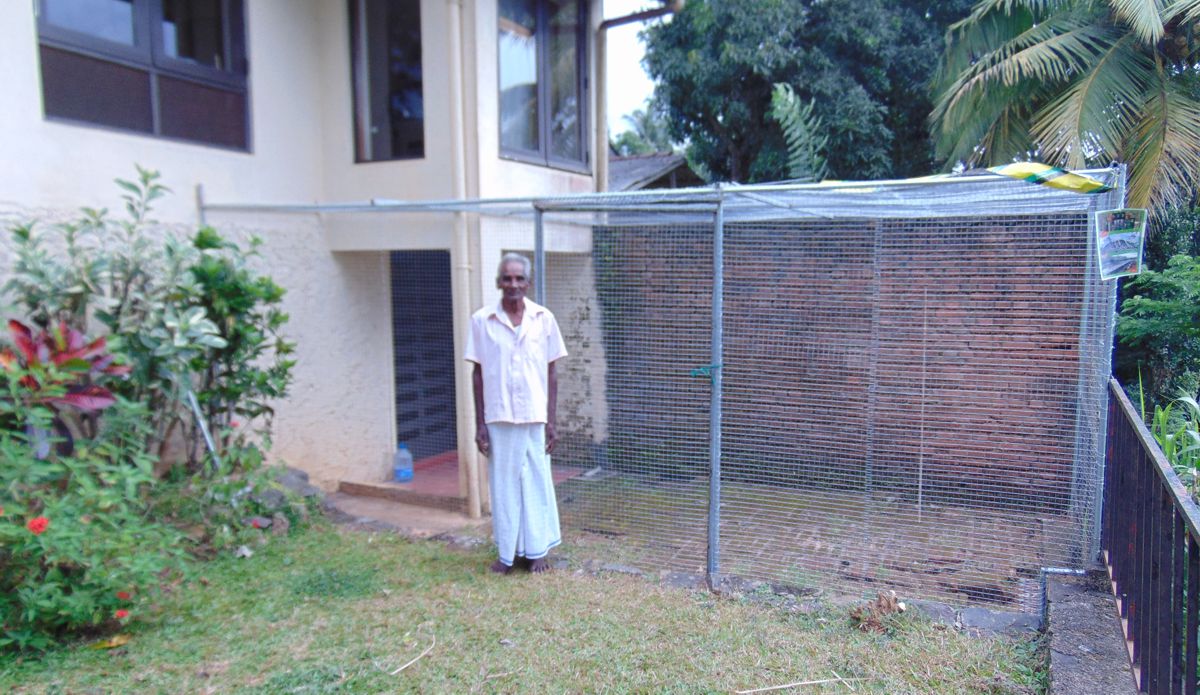 |
|
|
|
At the same time that Nimal and the welder built the monkey cage, they also installed reinforced railings on the steps, so that Visakha can now easily and safely amble all around the yard.
One of the requirements for growing vegetables is, of course, water. We realized that the rainwater from our roof was simply running into the sewer, so we've installed a new storage tank on the roof terrace. Rajah and Lily's cousin sealed the drain pipe from the roof and used screen so that we are not breeding mosquitos. Important since dengue is a serious danger these days! A pipe from the tank ends in a spigot at the back of the house near the monkey cage. It is very efficient and uses no artificial energy at all. Now we have biogas, solar water heating, and rainwater collection. May we be a little proud?
One more attempt to forestall the end of the world is our refusing to use plastic bags at the grocery store. Instead of placing each kind of vegetable in a separate plastic bag, we collect all the varieties in one bag or basket, put them separately (unbagged) on the scales to be weighed, and take them to the check-out counter in one or two reusable cloth bags. All of the price stickers are attached to the back of our shopping list, which is itself written on recycled paper. For all the other groceries we carry several more of the store's bags (rebate of 4 rupees each). For the last two months, we have not used a single plastic bag at any supermarket! Let's hear it for reusable bags. They are only beginning here, but are becoming more and more common in the rest of the world.
 |
|
| Cllick the image to see more photos of the ceremony. |
|
|
|
Our Chinese students invited us to a ceremony to celebrate the Buddha's birthday. This is a bathing of an image of the baby Bodhisattva, similar to the event in Japan, held on April 8. It was held at a temple near our former house in Dodanwala, a center which had often heard about, but had never visited.
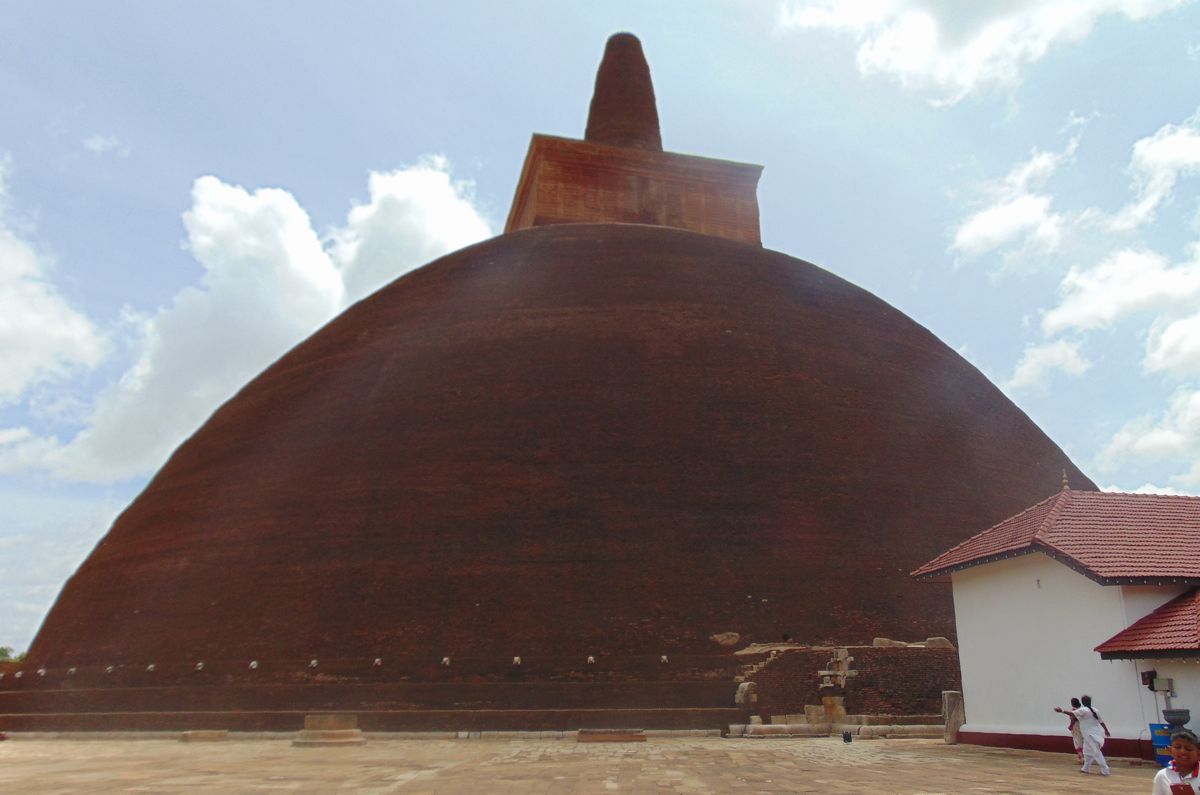 |
|
| Cllick the image to see more photos of the trip to Anuradhapura |
|
|
|
Two weeks ago, we made our first-ever day trip to Anuradhapura. We had never imagined that such a thing was possible, but . . . Ven. Nirodha, a British bhikkuni residing in Kandy, mentioned a university lecturer in Anuradhapura who had helped her very much. She told us that she deeply respects this teacher, but that she does not get to meet him very often. We suggested that we take her there and offer dana one day. She immediately agreed to the idea.
As it happened it was actually very easy. We packed the dana (which, of course, Lily had prepared) and left early in the morning. With Tissa driving, it was a comfortable ride, and we arrived in good time. We first stopped at an office and met the director of Samadeepa, an iterfaith organization devoted to peace and reconciliation, that Ven. Vimalananda works with. Then we drove to Abhayagiri, the monastery attached to the magnificent stupa in Anuradhapura. It was an incredible honor to be able to offer Buddha puja at that ancient place, long ago the center of Mahayana Buddhism in Sri Lanka. It was a thrill to be there, not as tourists but as devotees, to offer wholesome food and to be given an inspiring Dhamma talk in English.
Ven. Vimalananda studied at Benares Hindu University, where he earned his degree in Sanskrit in the Hindi medium. He also studied in Delhi and Kolkata. He now is an Assistant Lecturer at the Bhiksu University of Sri Lanka. He told us that he will come for dana in Kandy in the not to distant future. Altogether a splendid day!
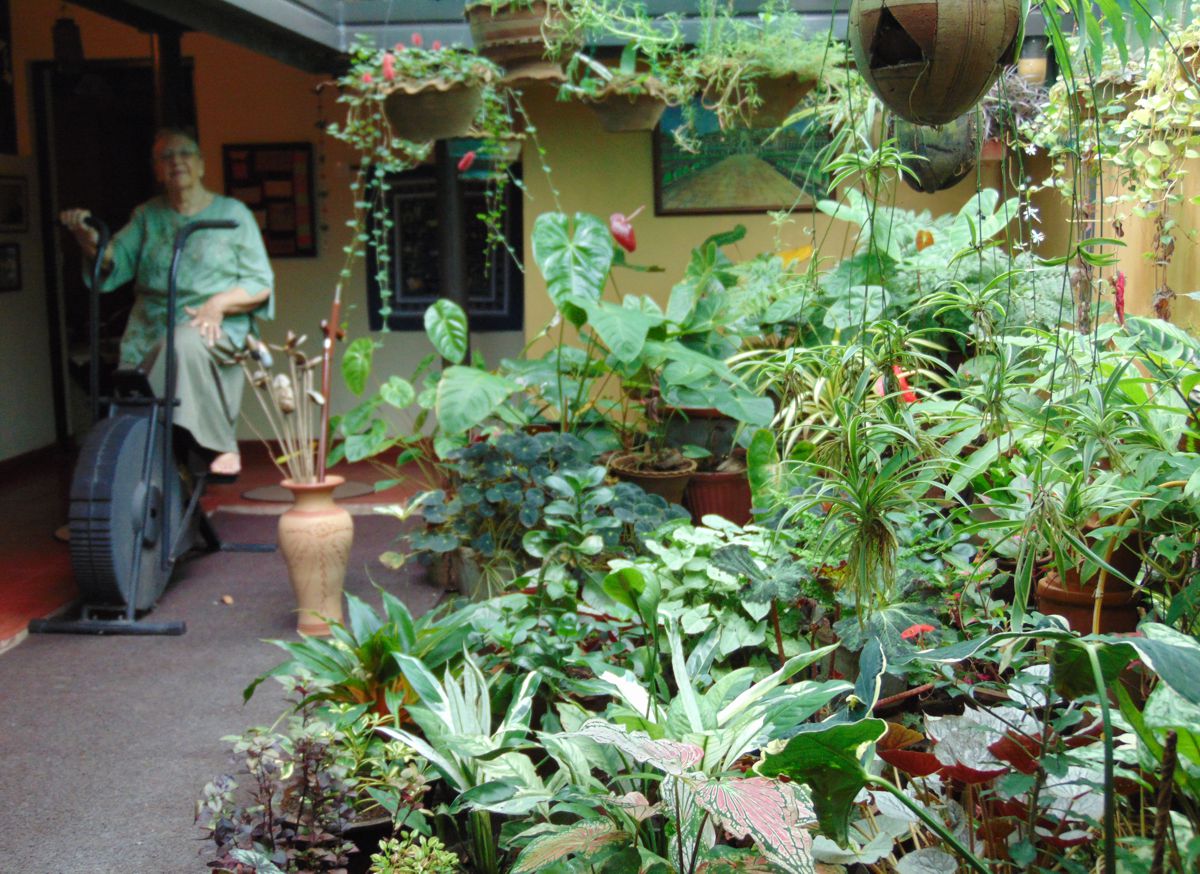 |
|
| Cllick the image to see more photos of the courtyard |
|
|
|
On the way back, we stopped at a huge nursery where we found many new plants to grace our courtyard, which is becoming more beautiful by the month. Lucky Visakha to be able to ride her exercise bike in this arboretum every evening and to breathe deeply the fresh oxygen generated by the multi-colored leaves!
Some time ago, we noticed that the strips of netting over the courtyard had become disturbed, leaving gaps. Perhaps by monkeys monkeying around, perhaps by cats chasing each other. (surely not Nezumi!). Last week, it was completely repaired and improved. New netting is now sandwiched between two layers of mesh, so that even panthers (if there were any) could not disarrange it. The courtyard is once more mosquito, and hence, dengue-free.
|
|
|
| Make a donation to help build a kuti for Ven. England Nirodha Bhikkhuni. |
|
| All donations are IRS tax-emempt and will be duly receipted. |
|
|
|
Coming back to Ven. Nirodha . . . She has just been offered land for a kuti in Bolowatte, the forest meditation retreat center, affiliated with Vajirarama (where we teach a weekly class for novices), the abbot of which is her sponsor. She would very much like to accept this offer. The site is in a deeply forested section of the center, and she's determined that as few trees as possible be sacrificed. The problem is that she cannot, by herself, afford the construction. We invite our generous donors to join us in this meritorious work. A contractor is ready to begin work as soon as sufficient funds are available. It is estimated that a suitable kuti would cost about US$5600.
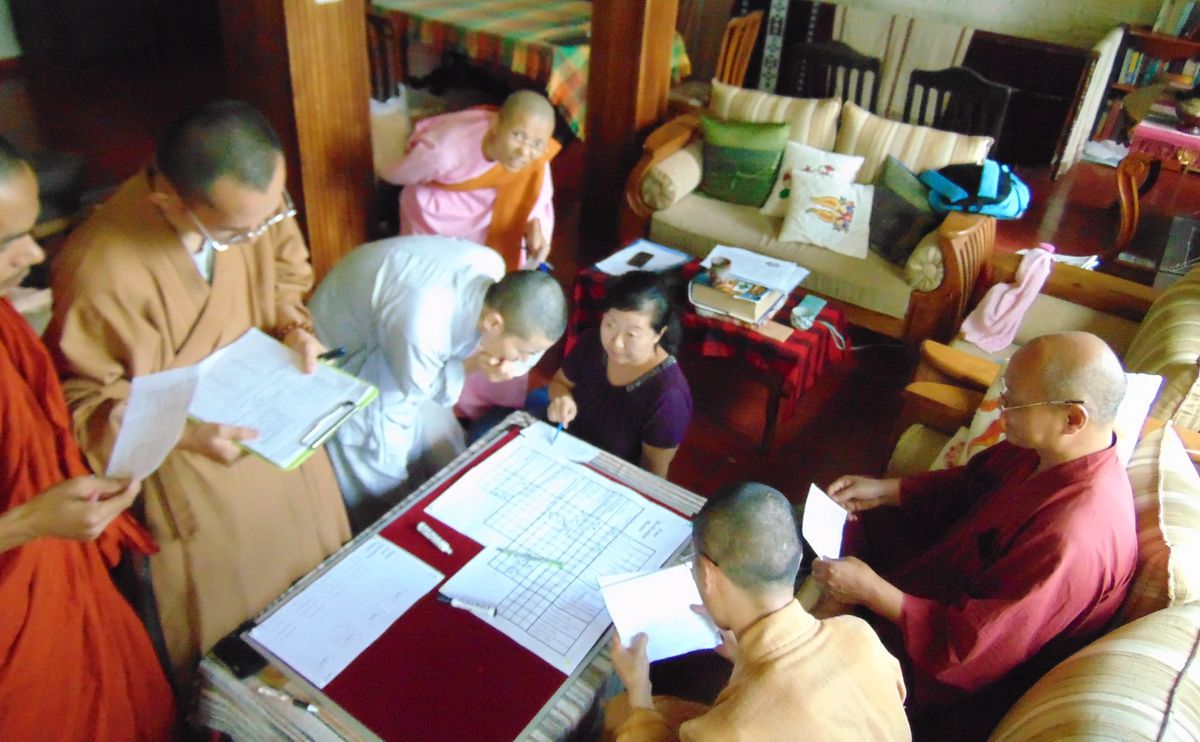 |
|
| Cllick the image to see more photos of the class and dana |
|
|
|
For about two months, at Subodharama, there was a continuous ceremony of chanting the Tipitaka, which made conducting English classes there difficult, so, for the intrim, we held Thursday class at our house, followed by lunch. It was wonderful offering dana every week. Once, instead of class, the students guided Ven. Namdak, a Dutch Vajrayana monk brought to Kandy by Ven. Lekdron, to the ancient temples we have visited during the Intensives. Ven. Namdak also gave a talk about the value of meditation to an enthusiastic group at Sanatha Suwaya. It was our first chance to see the finished meditation hall there.
Even though the Tipitaka chanting has concluded, we decided to have another special class at home so we could offer dana sharing merit especially with Terry, who is, as of this writing, in hospital after triple-bypass surgery. So many of the students know him that they wanted to do special chanting, which we recorded. Ven Tsundue, who is staying with us, also chanted a blessing from the Medicine Buddha in the Tibetan tradition. Ewen has flown to the US to be there while Terry is recuperating, for the sake of noble friendship.
As happens every year, our class of novices at Vajirarama is suspended for exams and vacation, but we have scheduled an offering of breakfast for Ken's birthday. In one of our last sessions, we let the students play Buddhist Knowledge Quest, and they thoroughly enjoyed it. They now tell us that our logic puzzles are too easy!
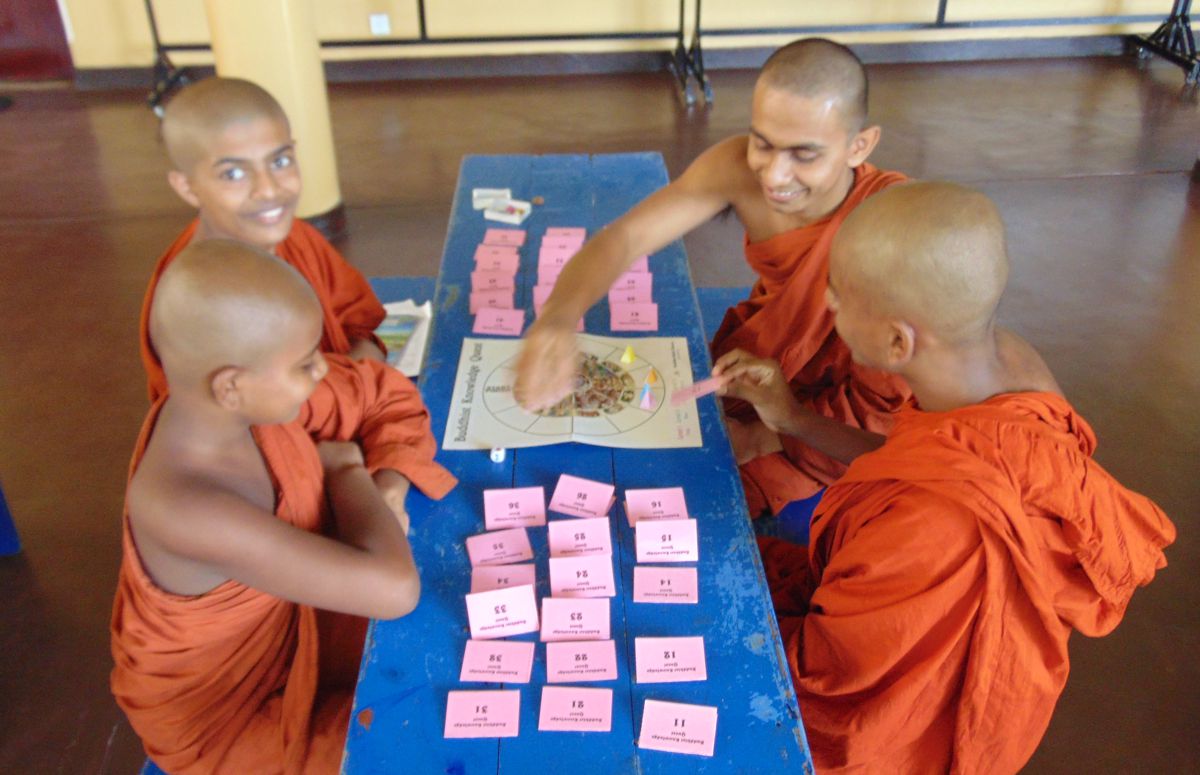 |
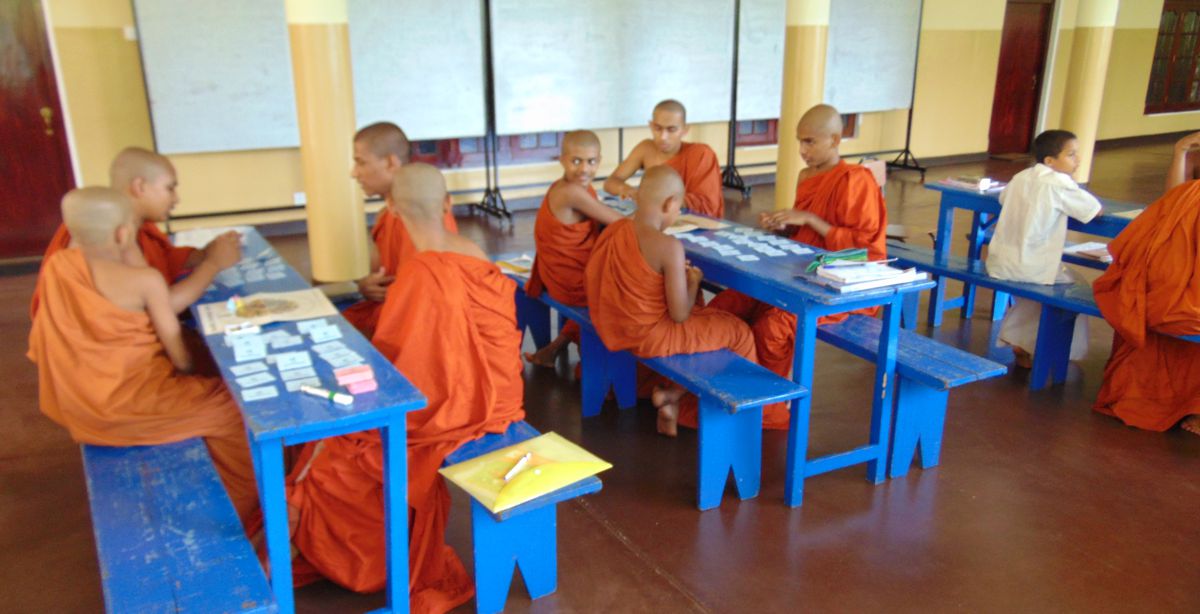 |
|
|
|
|
We are using our "free" time on the computers, working on the books we hope to have ready for publication "soon." Merit, of course, will be the central text for the intensive course in Bangalore (see below and please consider how you can help!). We are also compiling a reader of Buddhist stories with vocabulary, grammar, and comprehension exercises. A third book, Activities for Buddhist ESL, introduces many of the worksheets we have used in our courses here, including logic exercises and puzzles and a lot of critical thinking activities. Finally, we have often mentioned that many of our students have completed 10 Steps and 26 Steps, two books of controlled composition. These are solid, if unexciting materials, but then our students tend to be somewhat conservative language learners. Unfortunately, the passages are very "American" and, more than a little out of date, having been written in the sixties! To remedy those drawbacks, we are writing new passages, some Buddhist, but others simply Asian or international. We are also trying to include some which deal with environmental and social issues. We believe that, when it is finally finished, our students will find it both enjoyable and challenging. The pleasure of making good, durable teaching materials cannot be exaggerated!
Printed on a local three-wheeler:
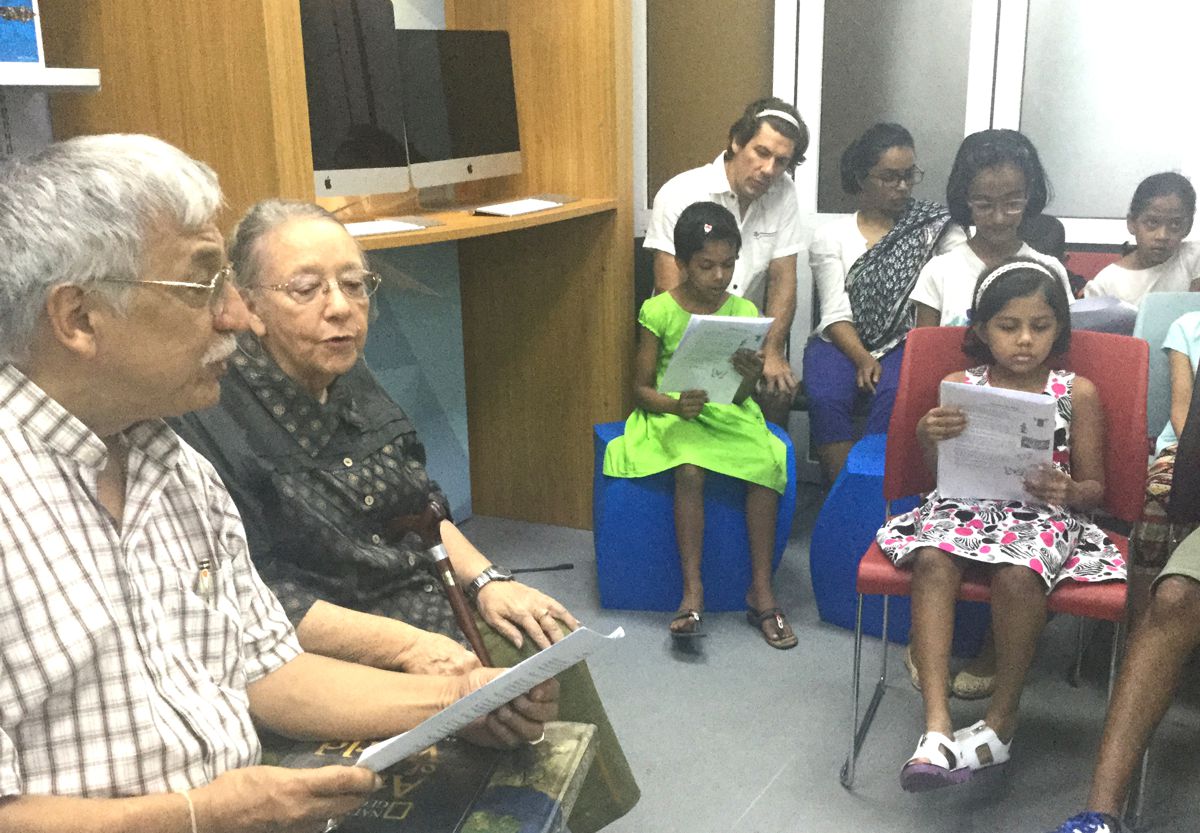 In June and July, we volunteered to lead two sing-along sessions at the American Corner (an extension of the American library) in Kandy. The first session was "serious"--"Last Night I had the Strangest Dream," "Blowing in the Wind," "Day Is Done," etc. At that songfest, we discovered that the songs were too challenging for the participants, aged 6-12, so the second sing-along was much lighter--"She'll Be Comin' 'Round the Mountain," "I've Been Working on the Railroad," "I Love the Mountains," and "B-I-N-G-O." The kids seemed to have a good time and we had fun too.
In June and July, we volunteered to lead two sing-along sessions at the American Corner (an extension of the American library) in Kandy. The first session was "serious"--"Last Night I had the Strangest Dream," "Blowing in the Wind," "Day Is Done," etc. At that songfest, we discovered that the songs were too challenging for the participants, aged 6-12, so the second sing-along was much lighter--"She'll Be Comin' 'Round the Mountain," "I've Been Working on the Railroad," "I Love the Mountains," and "B-I-N-G-O." The kids seemed to have a good time and we had fun too.
Ven. Amilasiri reports that all is well with the elderly monks at Bodhirukarama. We took dana to the monastery in May, but Ven. Amilasiri had been called for dana at the home of a local donor. He has come to Anniwatte, however, twice since them to receive donations, when he had other appointments in Kandy. We will be taking dana to Kurunegala later this month to celebrate Shehan's birthday.
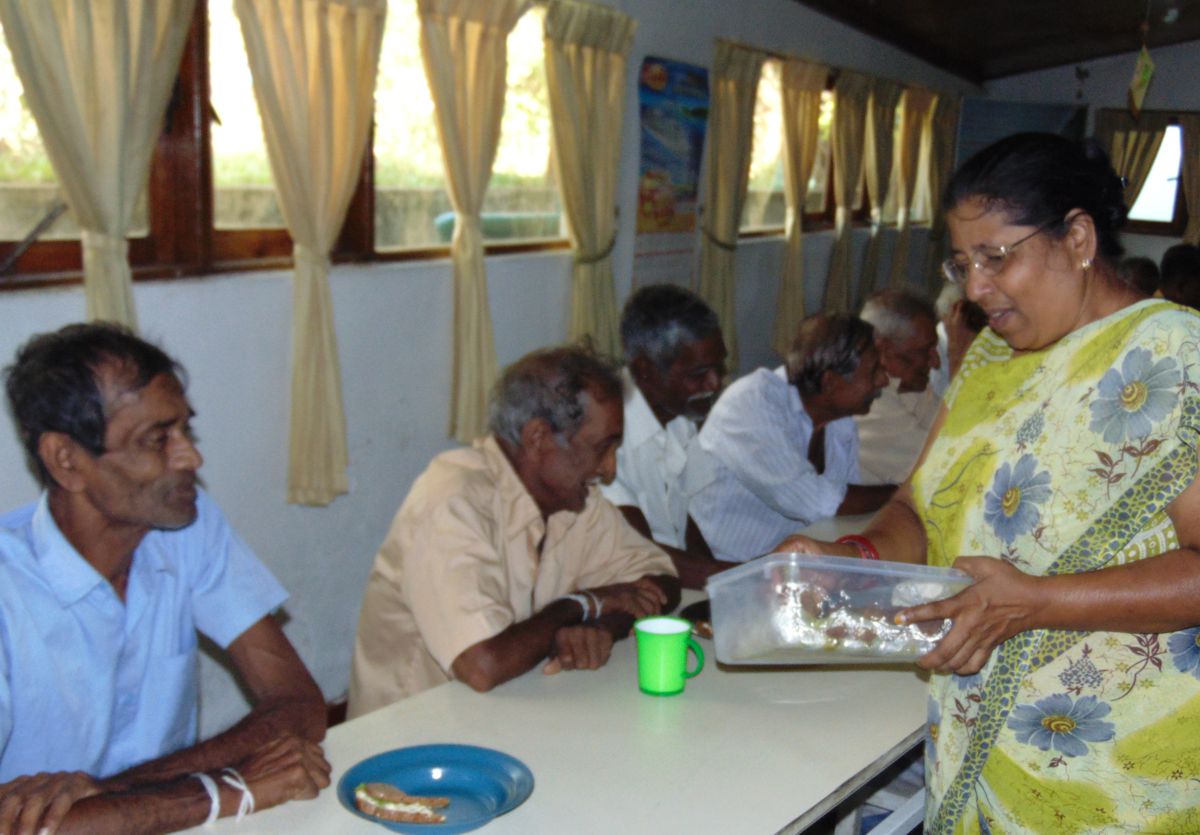 |
|
| Cllick the image to see more photos of tea at the Cancer Home. |
|
|
|
We try to take sandwiches, vegetarian cutlets, and other delectables to the Kandy Cancer Society Home for tea once a month. Recently, we have been joined by many friends. It is always satisfying. We spend several hours making cheese, egg, and vegetable sandwiches, and Lily recently rediscovered a recipe for "patiss," which are small Sri Lankan vegetarian versions of pasties, the national dish of Cornwall which became popular in Michigan when Cornish miners migrated to the Upper Peninsula in the 1800s.
With great dignity, the cancer patients file in, take their seats, and quietly wait to be served. No one complains, but you can see that they are weak, in pain, and, discomfort. Few speak English, but many pause to express their thanks with a broad smile as they leave. Several months ago, the matron informed us that the center was in dire need of bedding and mosquito nets. We sent out an appeal to local donors, and the response was overwhelming. A shop in Kandy offered to sell us sheets, pillow cases, and mosquito nets at almost half price, and we were able to purchase sixty sets, enough for every bed and more than they'd expected. Presenting them was happy and serving the patients was a great joy. Sadhu! Sadhu!! Sadhu!!!
 |
|
| Cllick the image to see a selection of our collection of Hmong pieces |
|
|
|
An unexpected surprise came recently in an email message. A nurse and scholar in Iowa, who has extensively studied Hmong needlework, has published three books, and is working on yet another, asked for permission to use some of our photos from Ban Vinai. We have known that our YouTube slideshows have been widely viewed and shared among the Hmong community in the States, but this is the first time that anyone academic has expressed interest. Of course, we are delighted to have any of the photos used. Linda's new book is on Hmong "reverse applique," and we were interested to learn that the baby carrier we have from Ban Vinai is a rare example of that technique. Indeed, we searched the web and found many embroidered and batik Hmong baby carriers, but not even one reverse applique.
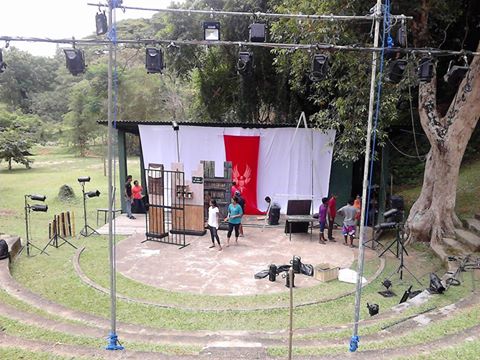 |
|
|
|
"Moral police goes berserk at Wala"
|
|
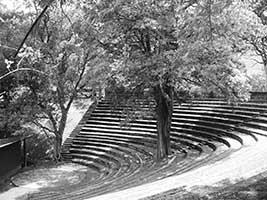 |
|
|
"Enforced morality in the 'Wala'?"
|
|
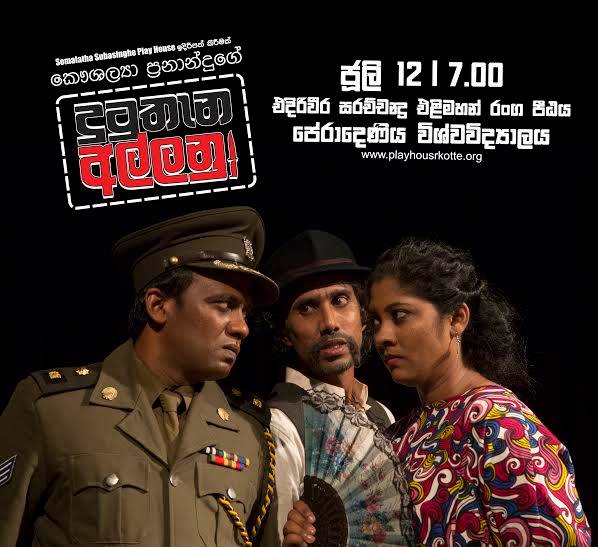 |
|
|
"Giving Sanity a Chance"
(Third paragraph)
|
|
| Click each image to read the article. |
|
|
|
|

We love the theater, so, last month, we were excited to be able to attend a nighttime performance of Wole Soyinka's "Wonyosi," an Africanization of Bertolt Brecht's "The Threepenny Opera," in the beautiful open-air amphitheater at the University of Peradeniya. The musical drama had been adapted and translated into Sinhala, so we would not understand a word of the dialogue, but the actions would speak loudly, and it was sure to be an important event. The evening weather was perfect, the theater was full, and we could tell from the opening scenes that it was indeed a brilliant production. Strangely, about halfway through, we heard loud cries from the audience. At first, we assumed that this was part of the play, for the corrupt police on stage were harassing several main characters. Suddenly, people rose from their seats and began filing out. Then we noticed that some objects were being thrown onto the stage. The players carried on valiantly, but the shouts and hoots became so loud that all dialogue was lost. At that point, the actors gave up and conferred with officials. We asked a young man beside us what was happening, and he told us that students were protesting "unnecessary things," such as kissing, homosexuality, and smoking on stage, which violated the "sacred ground." We were dumbstruck, and even more so, when it was finally announced that the performance was being cancelled. For details, you can read three articles from The Island, the first Sri Lankan newspaper to cover the shameful event. The only thing we can add to the letters and reportage is that we know who in the audience was calling for the performance to continue. It was he with the loud voice who, years ago in Paris, brought Birgit Nilsson back for twenty-one encores with a cry of "Brava!" In this case, the cry was, "Continue the play! Fools, go home!" which brought forth a bow from the actors but no other positive effect. Even though Soyinka's works are in the syllabus of courses at the university, these students, obviously, didn't have a clue as to the importance of his work and weren't interested in learning anything whatsoever.
We couldn't agree more with Gamini Akmeemana's review in the Daily Mirror, August 3, 2016: "This is a culture clash. That it occurred at Peradeniya does not augur well for Sri Lanka as a progressive nation, because these students are going to be tomorrow's teachers, bureaucrats, shapers of the country's destiny. If they are blind worshippers of tradition and unable to tolerate anything deemed to be directly in contradiction with their beliefs, they lack the intellectual depth and flexibility needed to cope with the modern world."
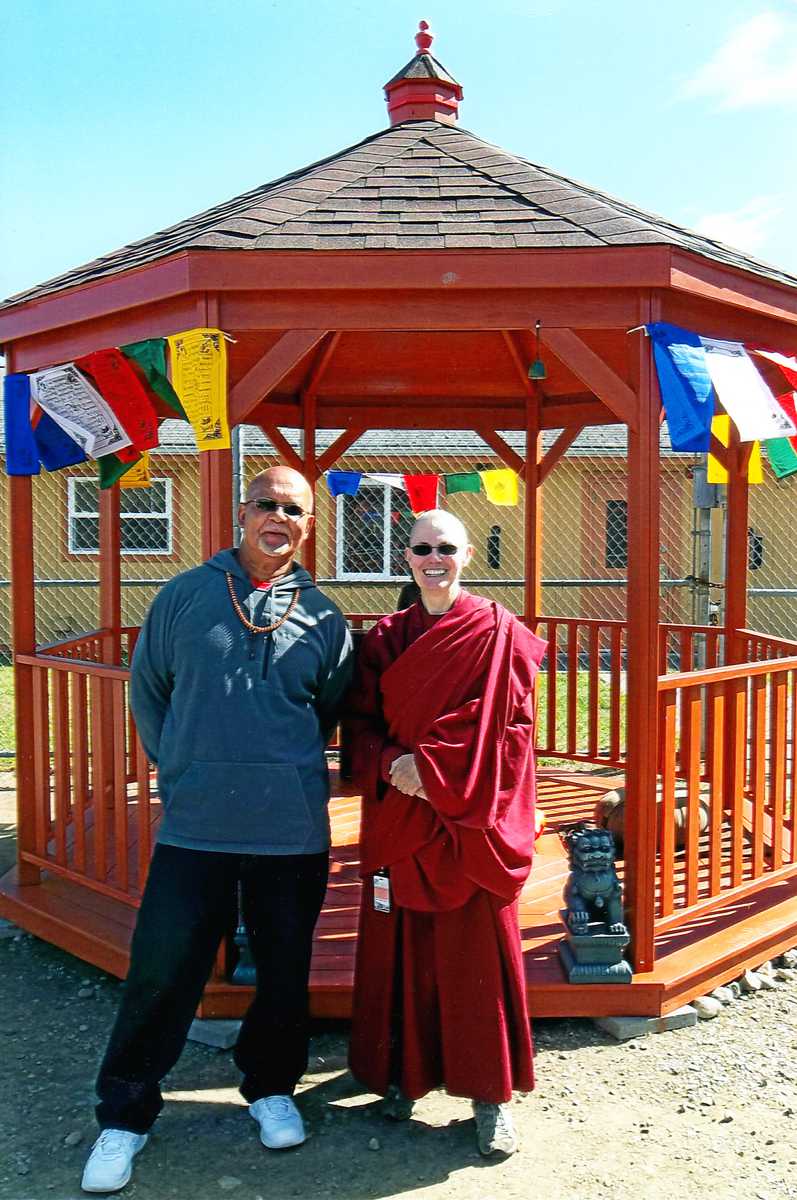 |
|
| Cllick this photo from last year's event to see this year's brochure. |
|
|
|
 |
|
| Calvin's group produced these shirts 20 years ago. |
|
|
|
In our reports, we have often mentioned Calvin Malone, who is being detained beyond his completed prison sentence in the McNeil Island Special Commitment Center (SCC) in Washington State. We had received an invitation to attend his group's annual Buddhist event, but, of course, it's a little far for us to travel. Instead, with permission from Chaplain Cloud, we ordered three boxes of dried fruit and nuts from Amazon to be served at the special lunch. We called Calvin the day after the event and learned that the boxes had arrived a few minutes before the celebration began. We have since received a copy of the event brochure, with a beautiful article by Calvin, and a card signed by all the inmate members of the SCC Sangha. Calvin has promised to make photos available through Dropbox, and we will include them in a report as soon as possible.
For the last month, John Dundon, a volunteer with the Schoolhouse has been staying with us. He has been teaching English to monks both in our library and at Subodharama. It is hard to determine who has enjoyed the lessons more, he or the students.
Back to Table of Contents

Buddhist Relief Mission
|
|
|
|





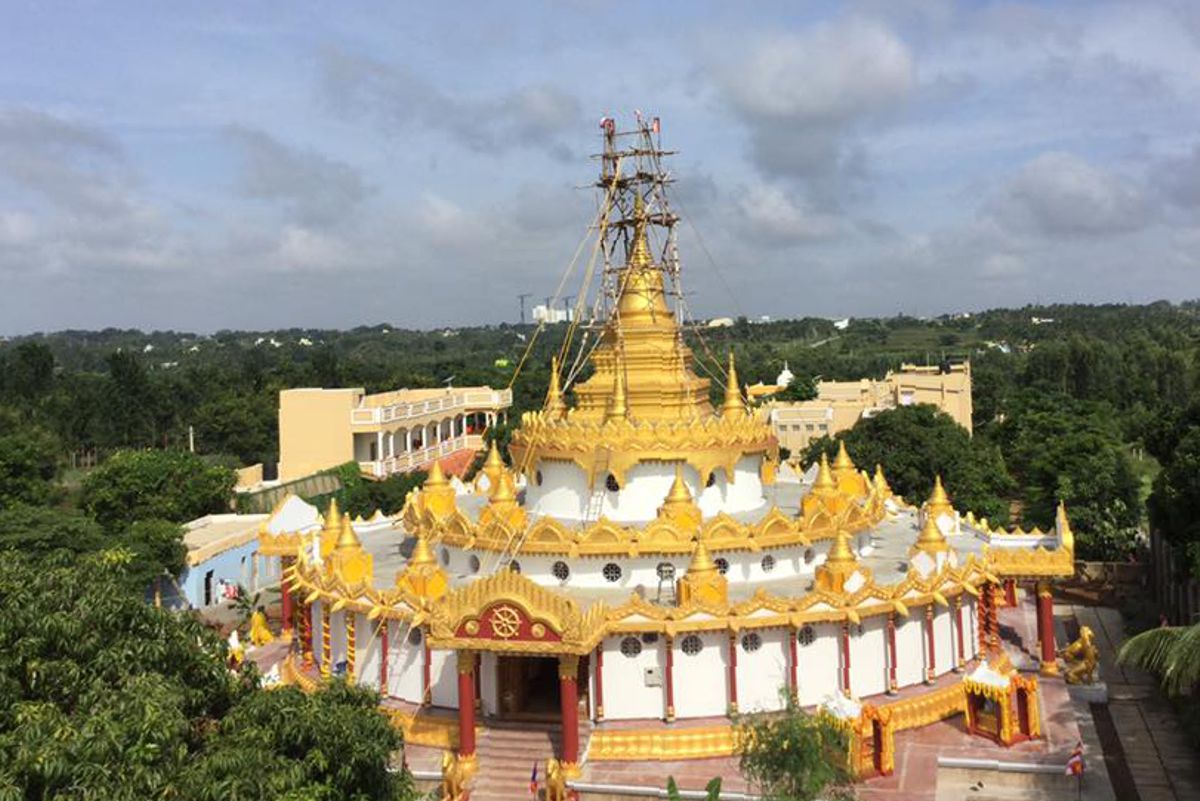

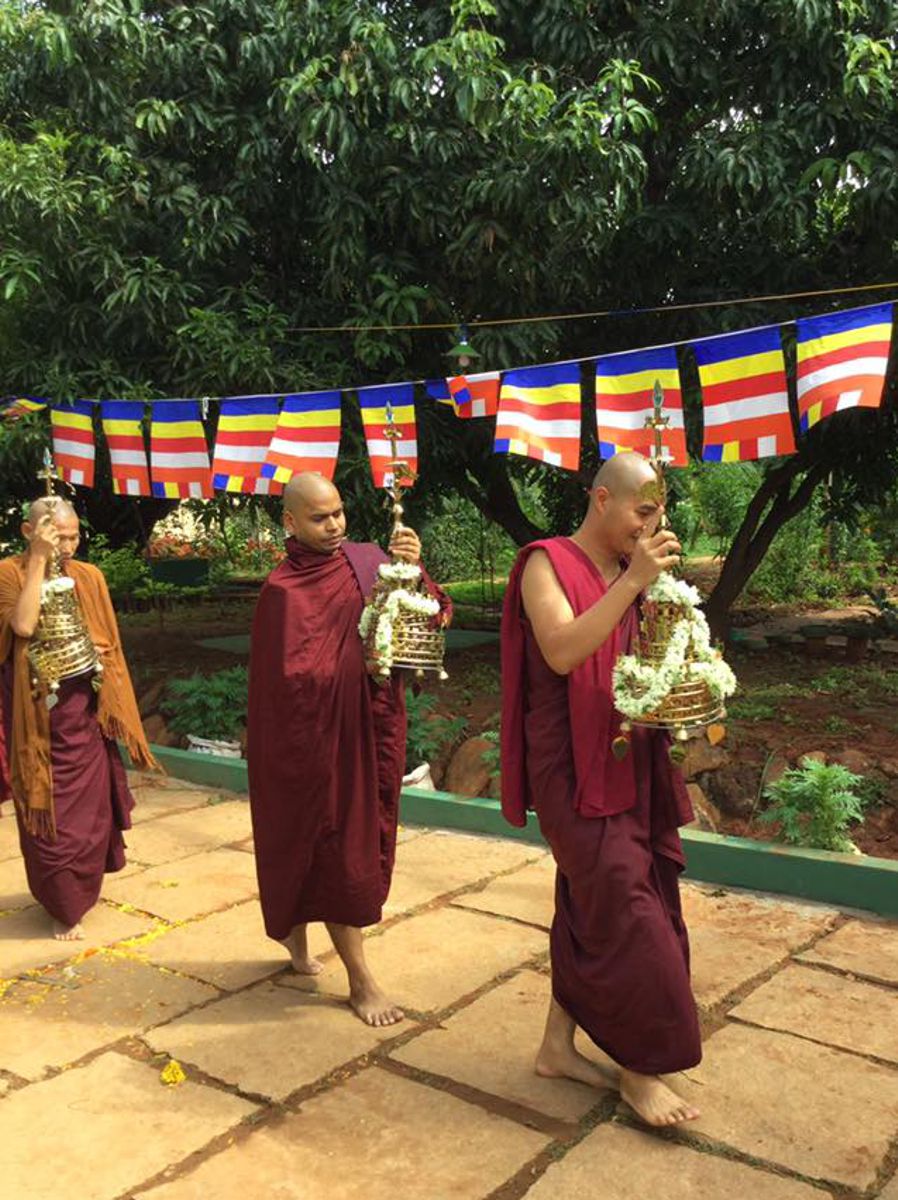
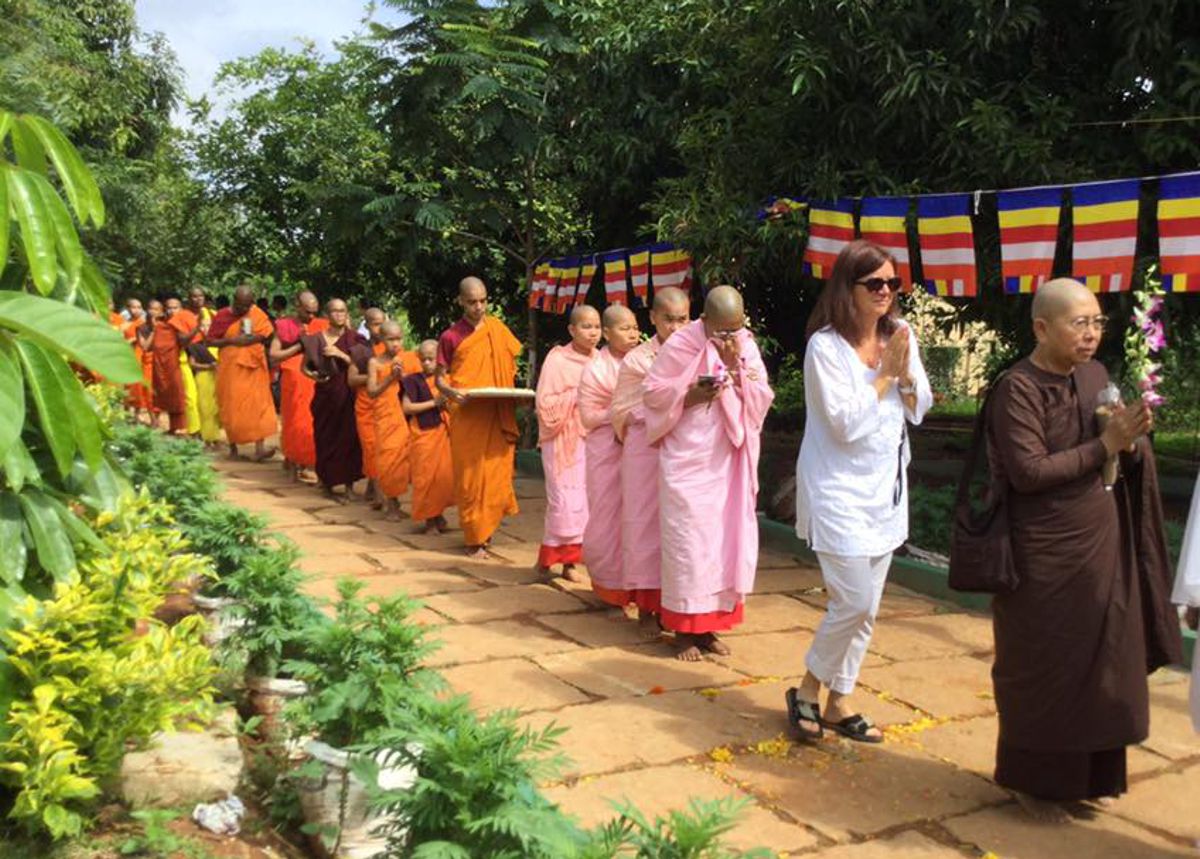
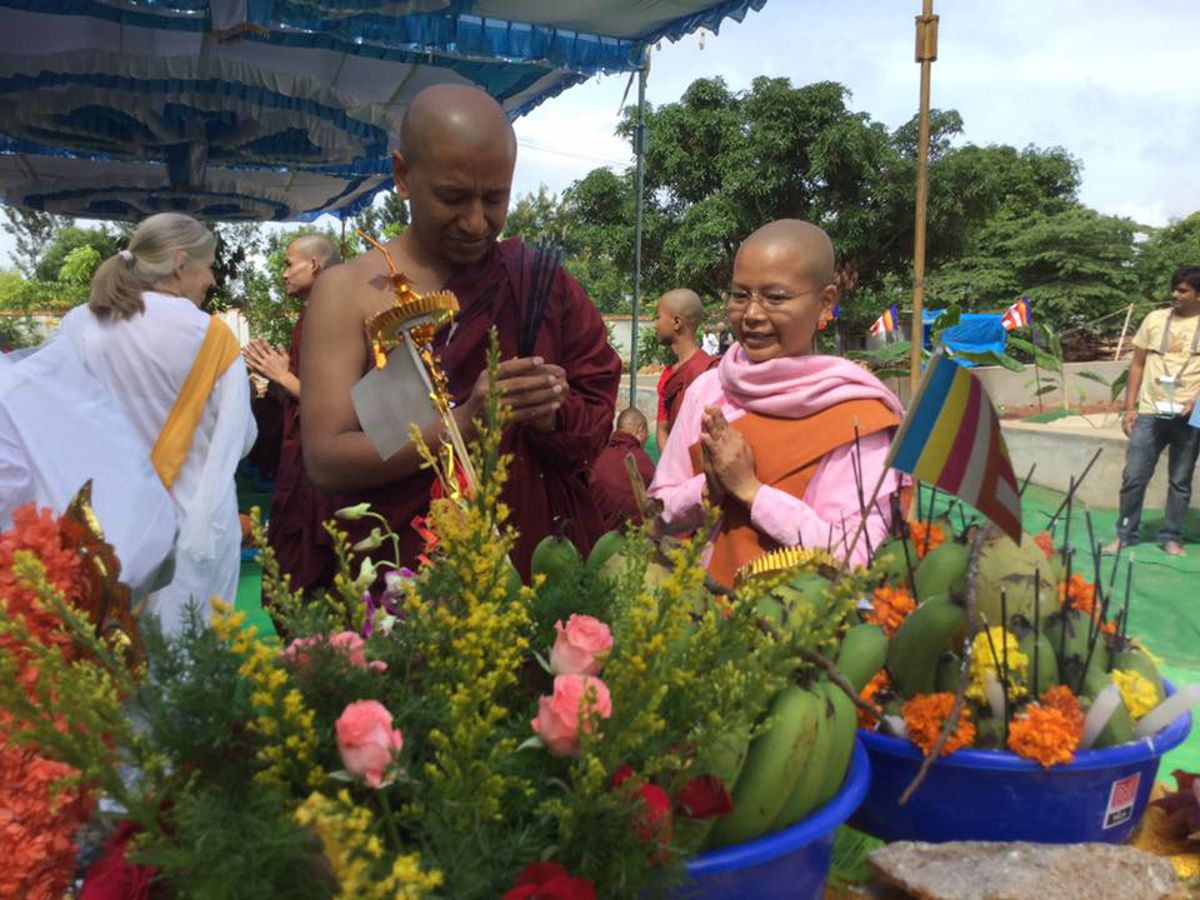
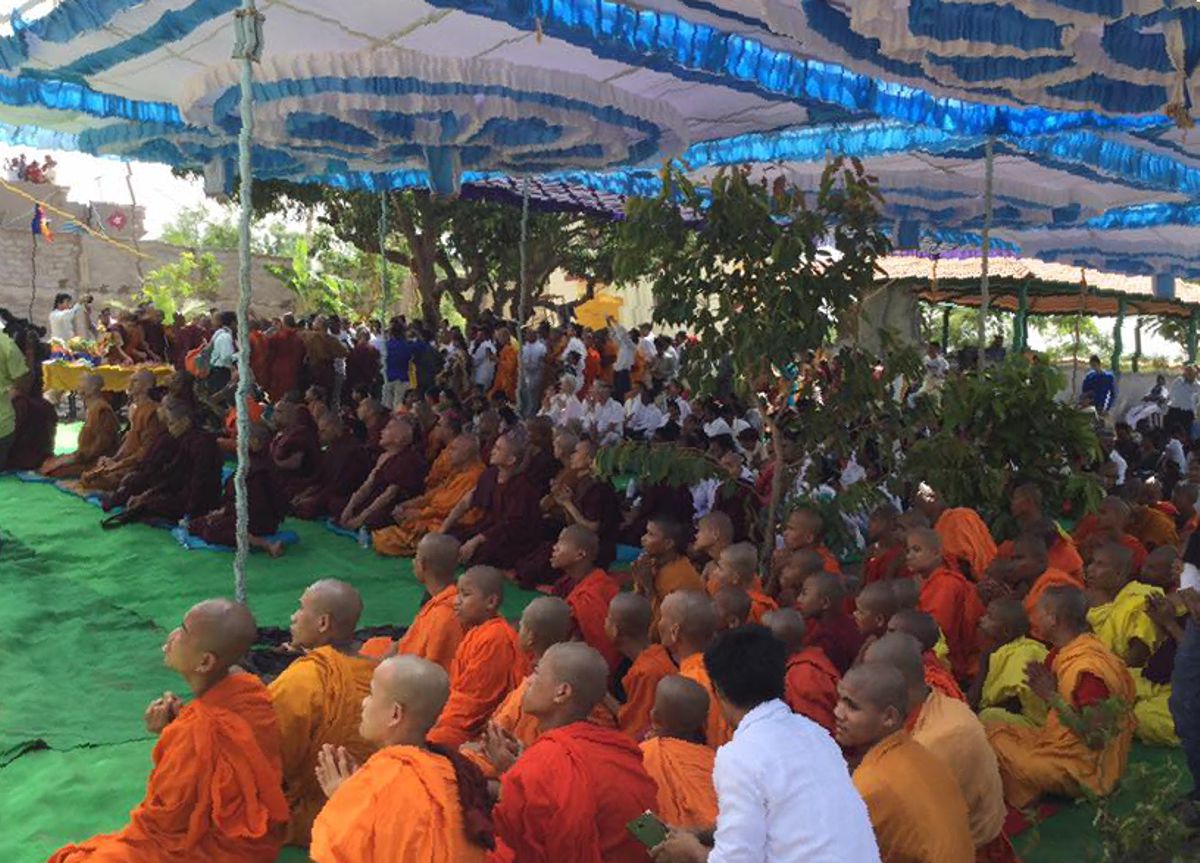
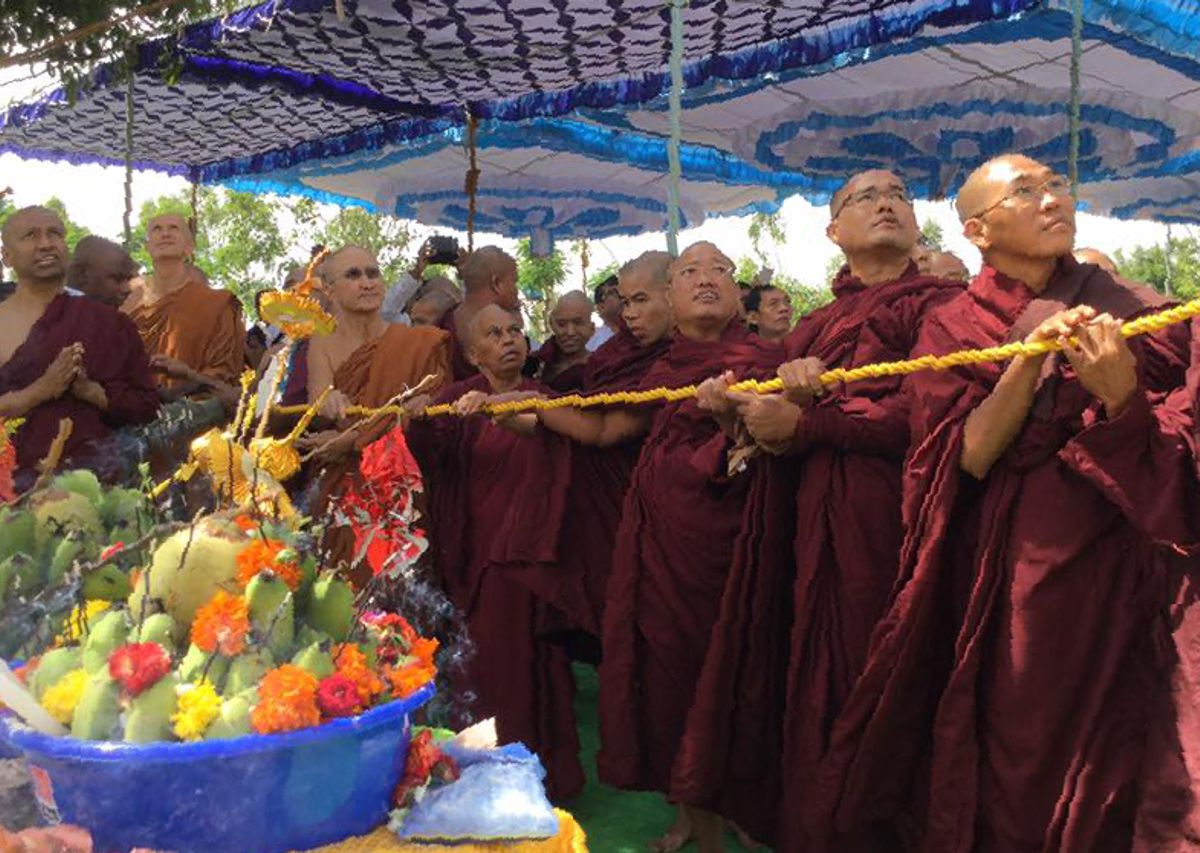



 Out of Michigan Citizens for Peace came weekly sessions which never had a name. They were, nonetheless, like a college seminar. We read and discussed A People's History of the United States, by Howard Zinn, and watched innumerable socially-engaged movies, including "Salt of the Earth," "The Cradle Will Rock," and "Matewan." We thoroughly enjoyed interacting with the well-informed and committed members, many of whom had worked in the factories and came by their activism through their unions. The issues we discussed then are still relevant today and reverberate loudly in the news--peace, gay rights, racial equality, the 1%, and more.
Out of Michigan Citizens for Peace came weekly sessions which never had a name. They were, nonetheless, like a college seminar. We read and discussed A People's History of the United States, by Howard Zinn, and watched innumerable socially-engaged movies, including "Salt of the Earth," "The Cradle Will Rock," and "Matewan." We thoroughly enjoyed interacting with the well-informed and committed members, many of whom had worked in the factories and came by their activism through their unions. The issues we discussed then are still relevant today and reverberate loudly in the news--peace, gay rights, racial equality, the 1%, and more. A couple of months ago, we sent this invitation to some friends. It was a great party. The world hasn't ended yet, but some ideas emerged from the discussion. We realized that we really need to be growing more of our own vegetables, in spite of the monkeys. We like our monkeys. A troop of macaques--babies clinging to mother's belly, rambunctious juveniles, serious adults, and wise elders--comes through regularly to entertain us. They also ravage plants. They feel so at home that they bring rambutans from the neighbor's tree and dine on our roof, leaving the shells for us to clean up. Not to discourage them, but to prevent sheer havoc, we have built three monkey cages, monkeys outside and vegetables safe inside. The latest and strongest is attached to the wall behind the house and includes a "pyramid" to increase garden space. We have also employed a full-time, resident gardener. Periya is 77 years old, but is quite active and obviously takes great pride in his ability to grow things. Because he's up early, the monkeys don't have a chance to get into any mischief. He makes a soft "Chuff Chuff" sound, swings a big stick, and the monkeys scamper away.
A couple of months ago, we sent this invitation to some friends. It was a great party. The world hasn't ended yet, but some ideas emerged from the discussion. We realized that we really need to be growing more of our own vegetables, in spite of the monkeys. We like our monkeys. A troop of macaques--babies clinging to mother's belly, rambunctious juveniles, serious adults, and wise elders--comes through regularly to entertain us. They also ravage plants. They feel so at home that they bring rambutans from the neighbor's tree and dine on our roof, leaving the shells for us to clean up. Not to discourage them, but to prevent sheer havoc, we have built three monkey cages, monkeys outside and vegetables safe inside. The latest and strongest is attached to the wall behind the house and includes a "pyramid" to increase garden space. We have also employed a full-time, resident gardener. Periya is 77 years old, but is quite active and obviously takes great pride in his ability to grow things. Because he's up early, the monkeys don't have a chance to get into any mischief. He makes a soft "Chuff Chuff" sound, swings a big stick, and the monkeys scamper away.




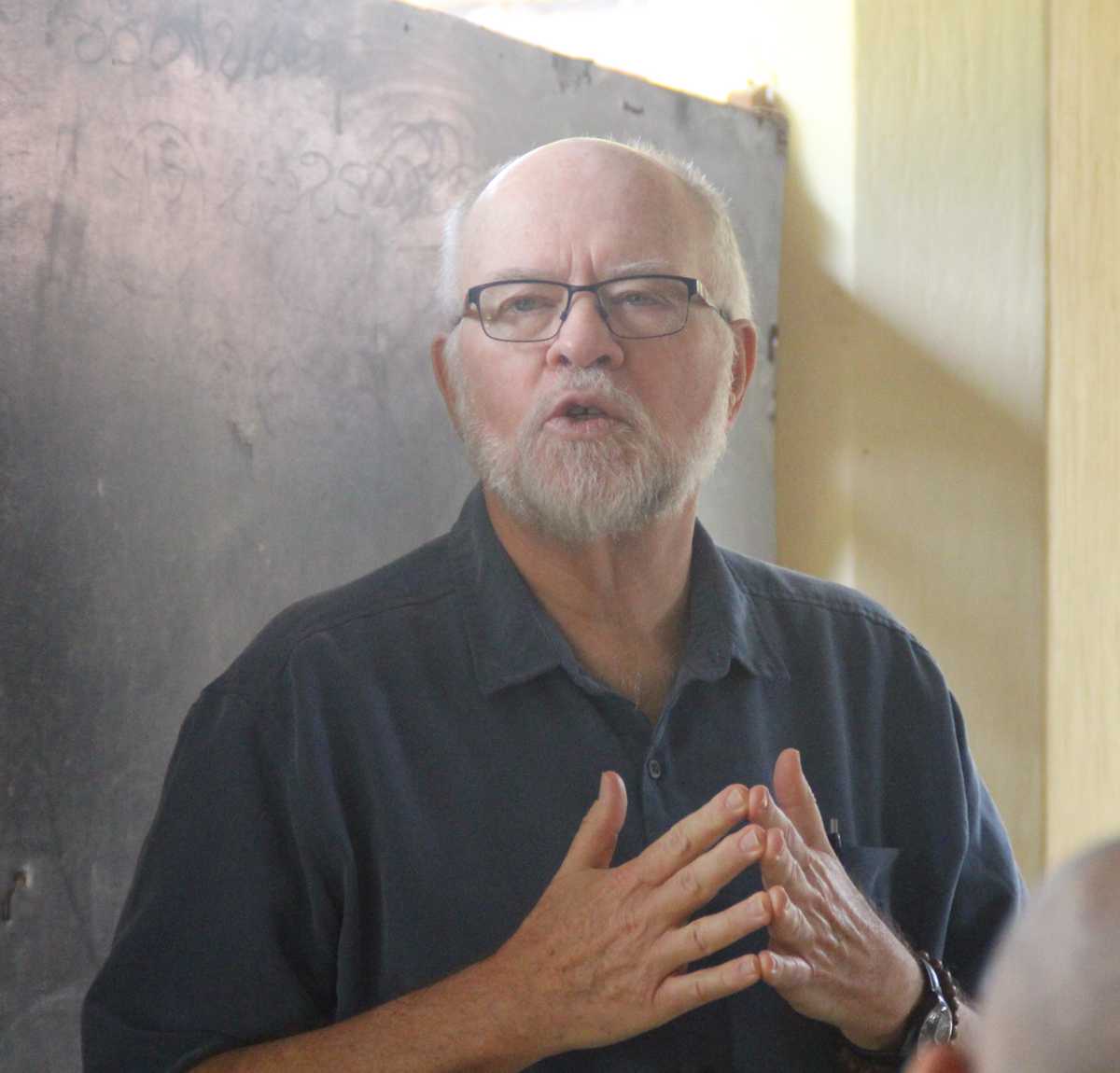



 In June and July, we volunteered to lead two sing-along sessions at the American Corner (an extension of the American library) in Kandy. The first session was "serious"--"Last Night I had the Strangest Dream," "Blowing in the Wind," "Day Is Done," etc. At that songfest, we discovered that the songs were too challenging for the participants, aged 6-12, so the second sing-along was much lighter--"She'll Be Comin' 'Round the Mountain," "I've Been Working on the Railroad," "I Love the Mountains," and "B-I-N-G-O." The kids seemed to have a good time and we had fun too.
In June and July, we volunteered to lead two sing-along sessions at the American Corner (an extension of the American library) in Kandy. The first session was "serious"--"Last Night I had the Strangest Dream," "Blowing in the Wind," "Day Is Done," etc. At that songfest, we discovered that the songs were too challenging for the participants, aged 6-12, so the second sing-along was much lighter--"She'll Be Comin' 'Round the Mountain," "I've Been Working on the Railroad," "I Love the Mountains," and "B-I-N-G-O." The kids seemed to have a good time and we had fun too. 